

EMI Cassette Tapes
Gold Top Inlay Series
#14. The Beatles 1962-1966 (TC2-PCSP 717)
(Update: 23th August 2025)




| New Records from EMI (August 1970) |
||||
| SHEET: FRONT | LP pages |
EMI Original
Promotional dealer leaflet. This promotional leaflet would detail the forthcoming June 1973 Records, Musicassettes, Reel to Reel, and 8-track cartridges releases. It says that cassette tapes and 8-track cartridge of "1962-1966/1967-1970" will be released at the same time on this June. It also states that the "Magical Mystery Tour" cassettes and 8-tracks will be available in the same month. |
||
 |
 |
|||
| SHEET: BACK |
8-Track
/ Musicassette Information Pages |
|||
 |
  |
|||
|
TITLE
|
THE BEATLES
1962-1966 |
|||
| CATALOG NUMBER | TC2-PCSP 717 / 0C 284 o 05325 |
|||
|
RELEASE DATE
|
June 1973 / First Issue | |||
| TRACK LISTING | SIDE 1 | SIDE 2 | ||
| Love Me Do (sim. stereo) |
Help |
|||
| Please Please Me |
You've Got To Hide Your Love Away |
|||
| From Me To You |
We Can Work It Out |
|||
| She Loves You (sim. stereo) |
Day Tripper |
|||
| I Want To Hold Your Hand |
Drive My Car |
|||
| All My Loving |
Norwegian Wood (This Bird Has
Flown) |
|||
| Can't Buy Me Love |
Nowhere Man |
|||
| A Hard Days Night |
Michelle |
|||
| And I Love Her |
In My Life |
|||
| Eight days a week |
Girl |
|||
| I Feel Fine |
Paperback Writer |
|||
| Ticket To Ride |
Eleanor Rigby |
|||
| Yesterday | Yellow Submarine | |||
| CASSETTE CASE AND TAPE |
CASE FRONT | CASE BACK | SIDE 1 --> Click! | SIDE 2 --> Click! |
 |
 |
 |
 |
|
| The cassette cases ("Norelco" cases)
were clear plastic at the front and around the spine area,
and black plastic at the rear. |
This UK issue has Lemon
Yellow paper label on light grey shell. |
|||
| INLAY |
INLAY: FRONT | INLAY: INSIDE |
||
 |
 |
|||
| EMI metallic effect "Gold Top" cassette
inlay Type-1: without Apple logomark. "EMI Records" was printed on the back of the inlay. ”Gold Top inlay" are believed to have been introduced in January 1972. |
||||
| INLAY: FRONT CLOSE UP | ||||
 |
 |
 |
The circular 1
7/8 " I.P.S. mark was printed at the spine. Apple logo was NOT printed on the inlay. EMI metallic effect "Gold Top" cassette inlay. |
|
| INLAY: FRONT CLOSE UP | ||||
 |
 |
|||
| EMI originally issued the Beatles
UK albums on cassette tape with re-arranged running orders,
the excuse being the need to have two sides of equal length
to avoid the problem of listeners stopping the tape at the
end of one side and turning over to start mid-way through
the opening track on the reverse. The cassette of the album "1962-1966" is recorded in the same order as the LP. |
||||
| INLAY: INSIDE CLOSE UP | ||||
 |
Catalog number "TC2-PCSP 717" and the EMI country code (*1) were printed on the inlay. |  |
Printer company's name "7306 DP(**)" was printed at the bottom of the inlay. | |
| INLAY: INSIDE CLOSE UP | ||||
 |
Gold top
inlay type-1: "E.M.I. Records (The Gramophone Company Ltd.)" credit was printed at the bottom of the inside of the inlay. |
|||
| LABEL CLOSE UP | ||||
 |
 |
 |
 |
|
| The cassettes
was issued NO Apple logo. The words "An Apple Tape Record" was printed on the label. |
Containing content as a prerecorded cassette is called "Musicassette" | dp(**) mark was moulded into cassette shells. | ||
| LABEL CLOSE UP | ||||
| SIDE
1 |
SIDE 2 |
The
cassette of the album "1962-1966" is recorded in the same
order as the LP. |
||
 |
 |
|||
| LABEL CLOSE UP | ||||
 |
 |
 |
||
| The words "Double Play Tape" was
printed on the label. Side-1: "Made in England / Made in U.S.A" was NOT embossed the shell. Side-2: "Made in England" was embossed the shell. |
||||
| OTHER ITEM | ||||
| - |
||||
| LABEL | Lemon Yellow Paper Label on Light Grey
Shell without Parlophone logo |
|||
| MIX | STEREO except as noted |
|||
| RECORD COMPANY'S NAME | EMI Records (The Gramophone Company Ltd.)
/ An E.M.I. Recording / An Apple Tape Record |
|||
| CENTRAL REMARK "SOLD IN U.K." |
- | |||
| RECORDING PUBLISHED CREDIT | (P) 1962, 63,64,65,66 |
|||
| INLAY FORM | Metallic effect gold inlay Type-1
(Foldover) |
|||
| SHELL | Light Grey Shell / embossed "MADE
IN ENGLAND" and "dp" logo mark |
|||
| CASSETTE CASE |
"Norelco"
cases: clear plastic at the front and around the spine area,
and black plastic at the rear. |
|||
| PRINTER CREDIT | Made and Printed in Great Britain / 7306
DP (Deta Packing) |
|||
| COVER DESIGN/ PHOTO/ NOTES | The album cover was designed by Tom
Wilkes. photographer: Angus McBean |
|||
| PRODUCER | George Martin | |||
| COMMENTS | Lemon Yellow paper label
without Parlophone logo on light grey shell cassette,
with its original inlay and case. "Gold Top inlay” are believed to have been introduced in January 1972. The G&L notation on the inside inlay indicates the printer's initials (Ernest J Day, Garrod & Lofthouse, or Data Packaging). EMI used the same metallic gold inlay design for the "1962-1966" and the “1967-1970” cassette issue, right up until 93, and didn’t issue a Ochre (lighter-brown) version during the 77-83 period. (maybe) The EMI UK catalog no. (TC2-PCSP-717) was on the spine. The cassette cases ("Norelco" cases) were clear plastic at the front and around the spine area, and black plastic at the rear. (*1) EMI country code: 0C 284 o 05325 The EMI country codes (introduced on 1 June, 1969): In most cases the EMI Codes are the first two letters of the record's catalog#. These EMI Country Codes were used to indicate the country in which the record was pressed. Note this doesn't necessarily means the record was also released in that country (from Discog). OC / 0C / 1E= UK (**)Data Packaging Corporation: (who also traded as Hellerman Data Packaging Ltd) supplied cassette and 8 track shells, tape and other components to the music industry. The "DP" logo can often be found moulded into cassette shells, especially during the early to mid 1970s. |
|||
|
TITLE
|
THE BEATLES
1962-1966 |
|||
| CATALOG NUMBER | TC2-PCSP 717 / 0C 284 o 05325 |
|||
|
RELEASE DATE
|
late 1973 / Second Issue? | |||
| TRACK LISTING | SIDE 1 | SIDE 2 | ||
| Love Me Do (sim. stereo) |
Help |
|||
| Please Please Me |
You've Got To Hide Your Love Away |
|||
| From Me To You |
We Can Work It Out |
|||
| She Loves You (sim. stereo) |
Day Tripper |
|||
| I Want To Hold Your Hand |
Drive My Car |
|||
| All My Loving |
Norwegian Wood (This Bird Has
Flown) |
|||
| Can't Buy Me Love |
Nowhere Man |
|||
| A Hard Days Night |
Michelle |
|||
| And I Love Her |
In My Life |
|||
| Eight days a week |
Girl |
|||
| I Feel Fine |
Paperback Writer |
|||
| Ticket To Ride |
Eleanor Rigby |
|||
| Yesterday | Yellow Submarine | |||
| CASSETTE CASE AND TAPE |
CASE FRONT | CASE BACK | SIDE 1 --> Click! | SIDE 2 --> Click! |
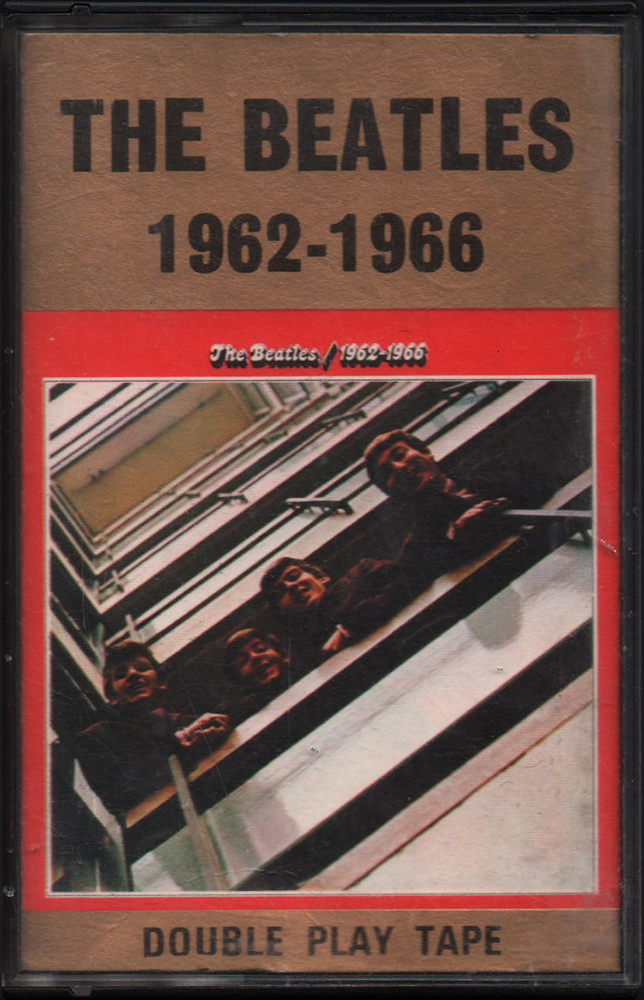 |
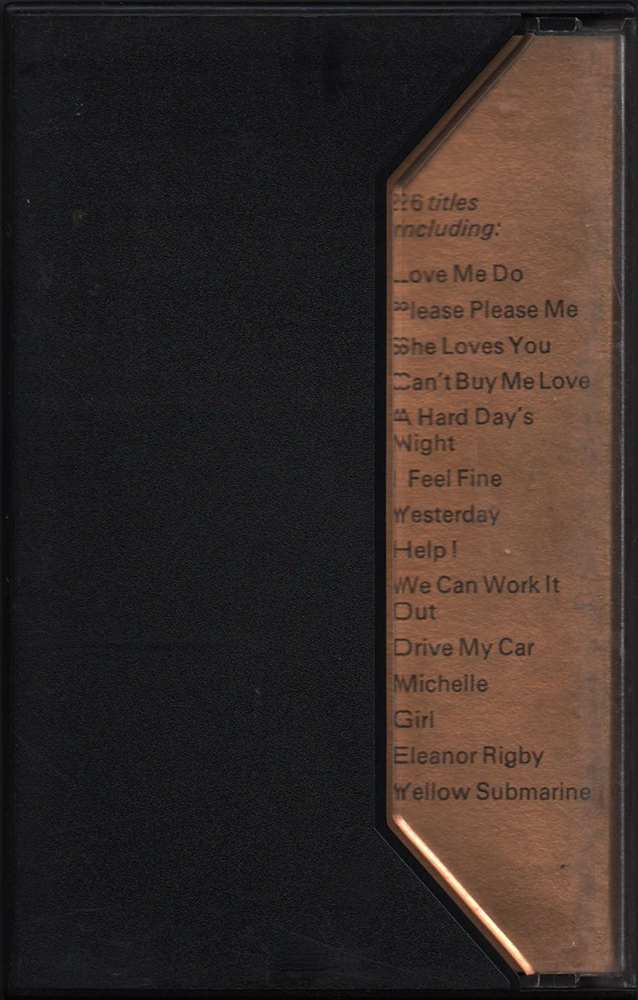 |
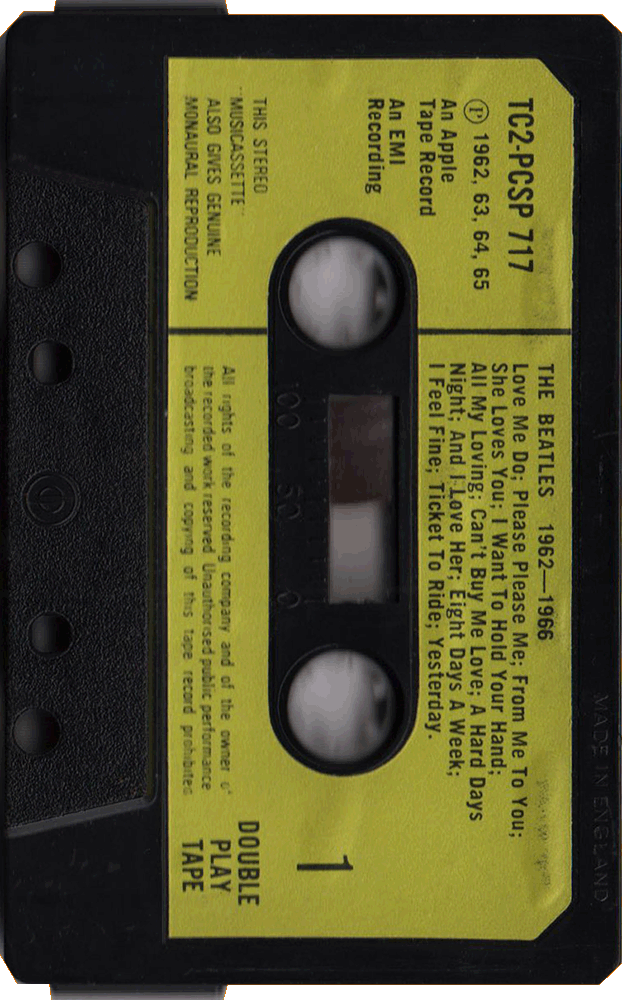 |
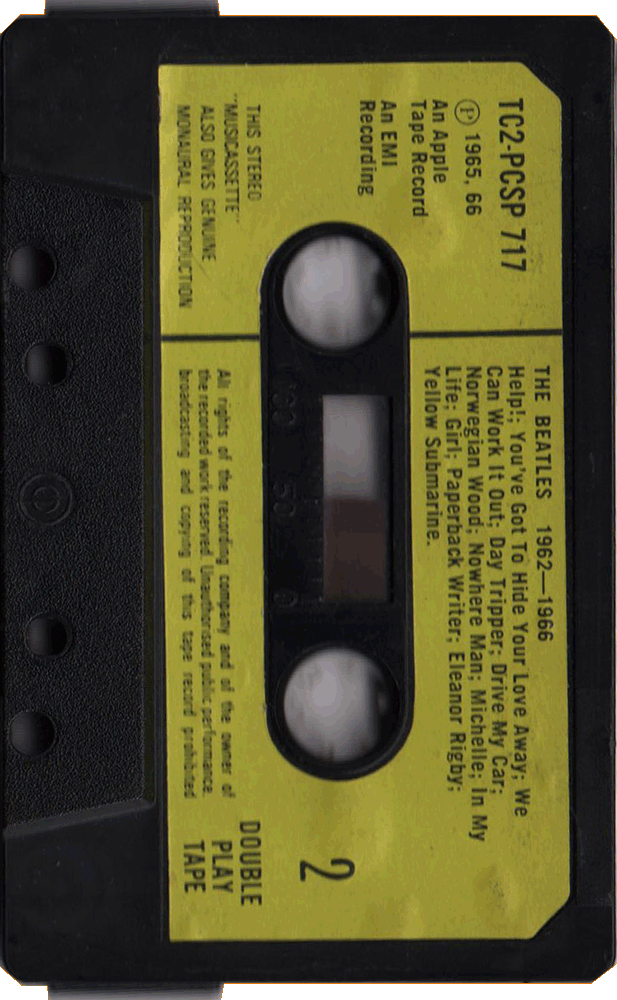 |
|
| The cassette cases ("Norelco" cases)
were clear plastic at the front and around the spine area,
and black plastic at the rear. |
This UK issue has Lemon
Yellow
paper label on black shell. |
|||
| INLAY |
INLAY: FRONT | INLAY: INSIDE |
||
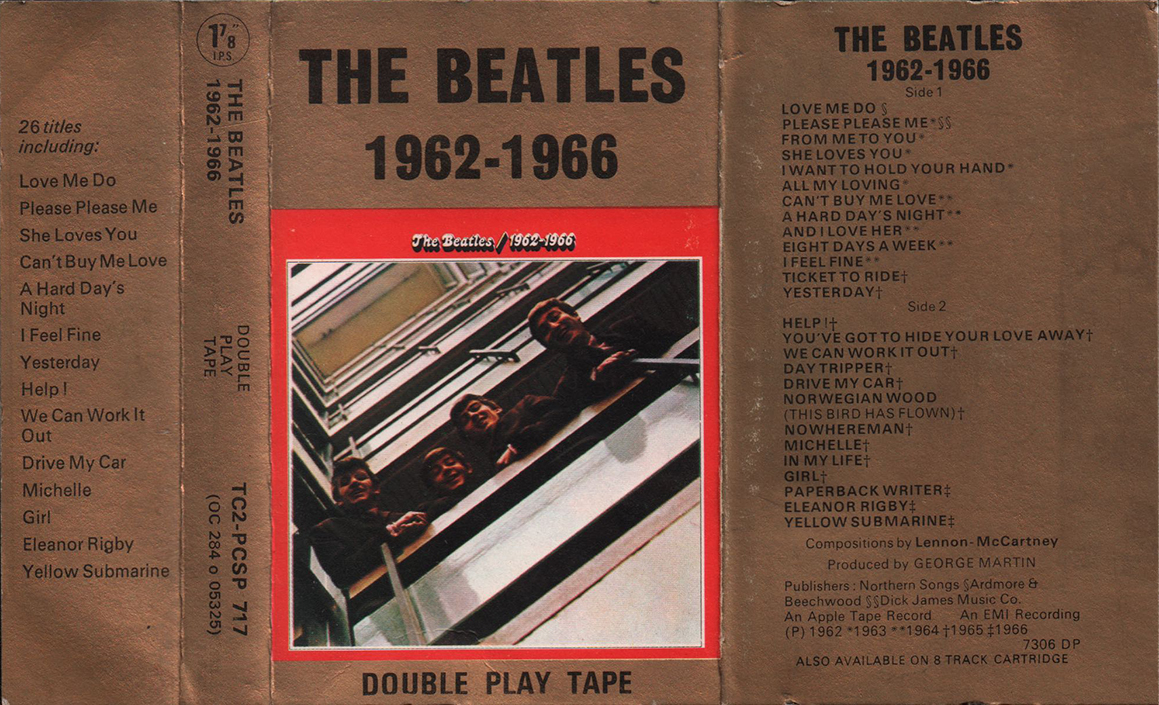 |
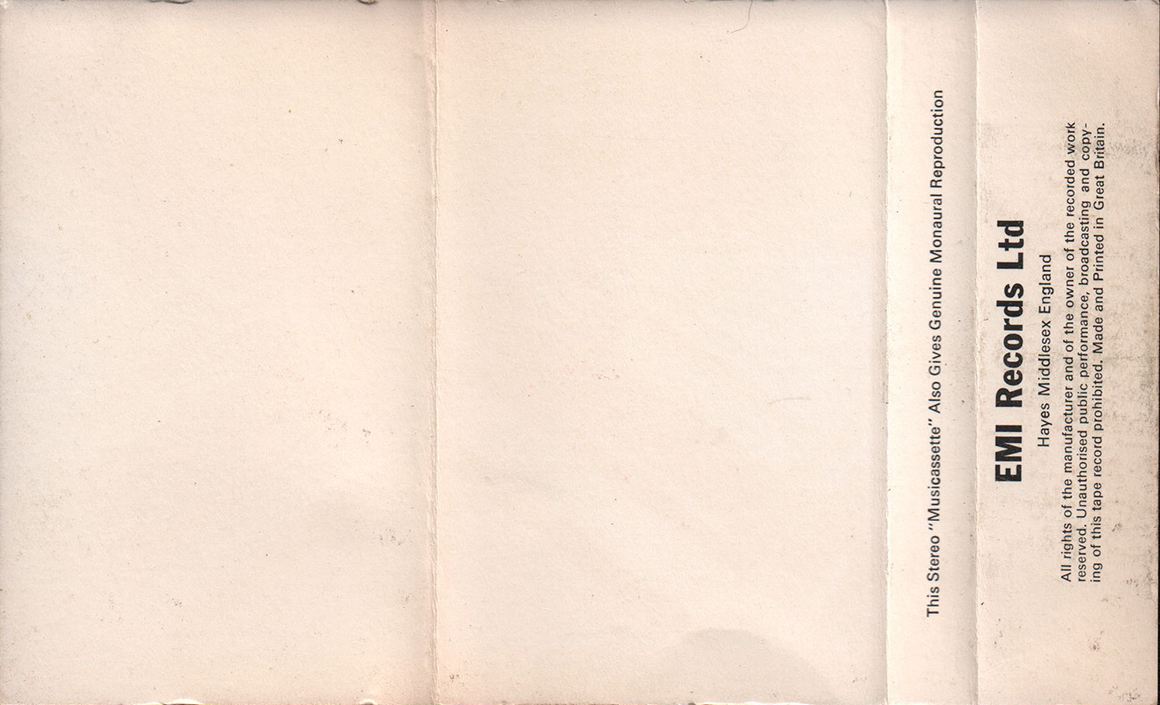 |
|||
| EMI metallic effect "Gold Top" cassette
inlay Type-2: without Apple logomark. "EMI Records Ltd." was printed on the back of the inlay. ”Gold Top inlay" are believed to have been introduced in January 1972. |
||||
| INLAY: FRONT CLOSE UP | ||||
 |
 |
 |
The circular 1
7/8 " I.P.S. mark was printed at the spine. Apple logo was NOT printed on the inlay. EMI metallic effect "Gold Top" cassette inlay. |
|
| INLAY: FRONT CLOSE UP | ||||
 |
 |
|||
| EMI originally issued the Beatles
UK albums on cassette tape with re-arranged running orders,
the excuse being the need to have two sides of equal length
to avoid the problem of listeners stopping the tape at the
end of one side and turning over to start mid-way through
the opening track on the reverse. The cassette of the album "1962-1966" is recorded in the same order as the LP. |
||||
| INLAY: INSIDE CLOSE UP | ||||
 |
Catalog number "TC2-PCSP 717" and the EMI country code (*1) were printed on the inlay. |  |
Printer company's name "7306 DP(**)" was printed at the bottom of the inlay. | |
| INLAY: INSIDE CLOSE UP | ||||
 |
Gold top
inlay type-2: "EMI Records Ltd." credit was printed at the bottom of the inside of the inlay. |
|||
| LABEL CLOSE UP | ||||
 |
 |
 |
 |
|
| The cassettes
was issued NO Apple logo. The words "An Apple Tape Record" was printed on the label. |
Containing content as a prerecorded cassette is called "Musicassette" | dp(**) mark was moulded into cassette shells. | ||
| LABEL CLOSE UP | ||||
| SIDE
1 |
SIDE 2 |
The
cassette
of the album "1962-1966" is recorded in the same order as
the LP. |
||
 |
 |
|||
| LABEL CLOSE UP | ||||
 |
 |
 |
||
| The words "Double Play Tape" was
printed on the label. Side-1: "MADE IN ENGLAND" was embossed the shell. Side-2: "Made in England/ Made in U.S.A." was NOT embossed the shell. |
||||
| OTHER ITEM | ||||
| - |
||||
| LABEL | Lemon Yellow Paper Label on Black Shell
without Parlophone logo |
|||
| MIX | STEREO except as noted |
|||
| RECORD COMPANY'S NAME | EMI Records Ltd. / An E.M.I.
Recording / An Apple Tape Record |
|||
| CENTRAL REMARK "SOLD IN U.K." |
- | |||
| RECORDING PUBLISHED CREDIT | (P) 1962, 63,64,65,66 |
|||
| INLAY FORM | Metallic effect gold inlay Type-2
(Foldover) |
|||
| SHELL | Black Shell / embossed
"MADE IN ENGLAND" and "dp" logo mark |
|||
| CASSETTE CASE |
"Norelco"
cases:
clear plastic at the front and around the spine area, and
black plastic at the rear. |
|||
| PRINTER CREDIT | Made and Printed in Great Britain / 7306
DP (Deta Packing) |
|||
| COVER DESIGN/ PHOTO/ NOTES | The album cover was designed by Tom
Wilkes. photographer: Angus McBean |
|||
| PRODUCER | George Martin | |||
| COMMENTS | Lemon Yellow paper label
without Parlophone logo on Black shell cassette, with
its original inlay and case. "Gold Top inlay” are believed to have been introduced in January 1972. The G&L notation on the inside inlay indicates the printer's initials (Ernest J Day, Garrod & Lofthouse, or Data Packaging). EMI used the same metallic gold inlay design for the "1962-1966" and the “1967-1970” cassette issue, right up until 93, and didn’t issue a Ochre (lighter-brown) version during the 77-83 period. (maybe) Gold top inlay type-2: "EMI Records Ltd." credit was printed at the bottom of the inside of the inlay. The EMI UK catalog no. (TC2-PCSP-717) was on the spine. The cassette cases ("Norelco" cases) were clear plastic at the front and around the spine area, and black plastic at the rear. (*1) EMI country code: 0C 284 o 05325 The EMI country codes (introduced on 1 June, 1969): In most cases the EMI Codes are the first two letters of the record's catalog#. These EMI Country Codes were used to indicate the country in which the record was pressed. Note this doesn't necessarily means the record was also released in that country (from Discog). OC / 0C / 1E= UK (**)Data Packaging Corporation: (who also traded as Hellerman Data Packaging Ltd) supplied cassette and 8 track shells, tape and other components to the music industry. The "DP" logo can often be found moulded into cassette shells, especially during the early to mid 1970s. |
|||
|
TITLE
|
THE BEATLES
1962-1966 |
|||
| CATALOG NUMBER | TC2-PCSP 717 / 0C 284 o 05325 |
|||
|
RELEASE DATE
|
late 1973 / Second Issue? | |||
| TRACK LISTING | SIDE 1 | SIDE 2 | ||
| Love Me Do (sim. stereo) |
Help |
|||
| Please Please Me |
You've Got To Hide Your Love Away |
|||
| From Me To You |
We Can Work It Out |
|||
| She Loves You (sim. stereo) |
Day Tripper |
|||
| I Want To Hold Your Hand |
Drive My Car |
|||
| All My Loving |
Norwegian Wood (This Bird Has
Flown) |
|||
| Can't Buy Me Love |
Nowhere Man |
|||
| A Hard Days Night |
Michelle |
|||
| And I Love Her |
In My Life |
|||
| Eight days a week |
Girl |
|||
| I Feel Fine |
Paperback Writer |
|||
| Ticket To Ride |
Eleanor Rigby |
|||
| Yesterday | Yellow Submarine | |||
| CASSETTE CASE AND TAPE |
CASE FRONT | CASE BACK | SIDE 1 --> Click! | SIDE 2 --> Click! |
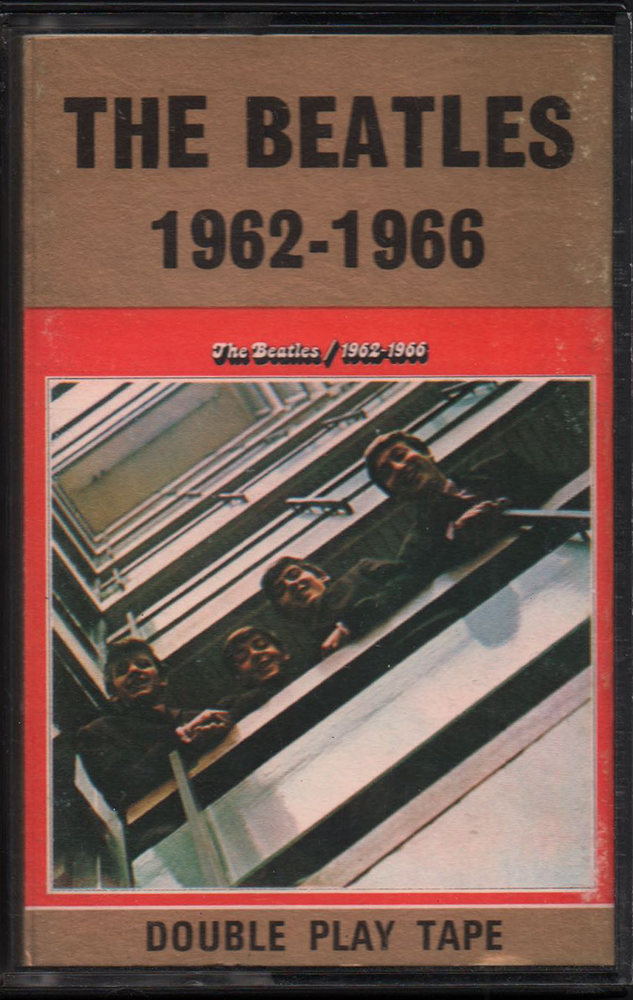 |
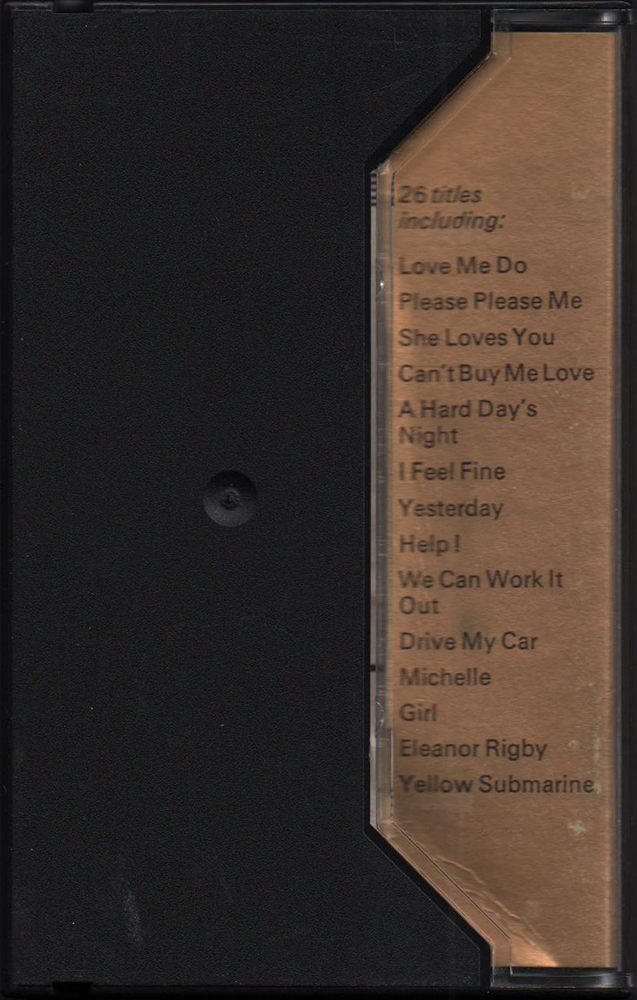 |
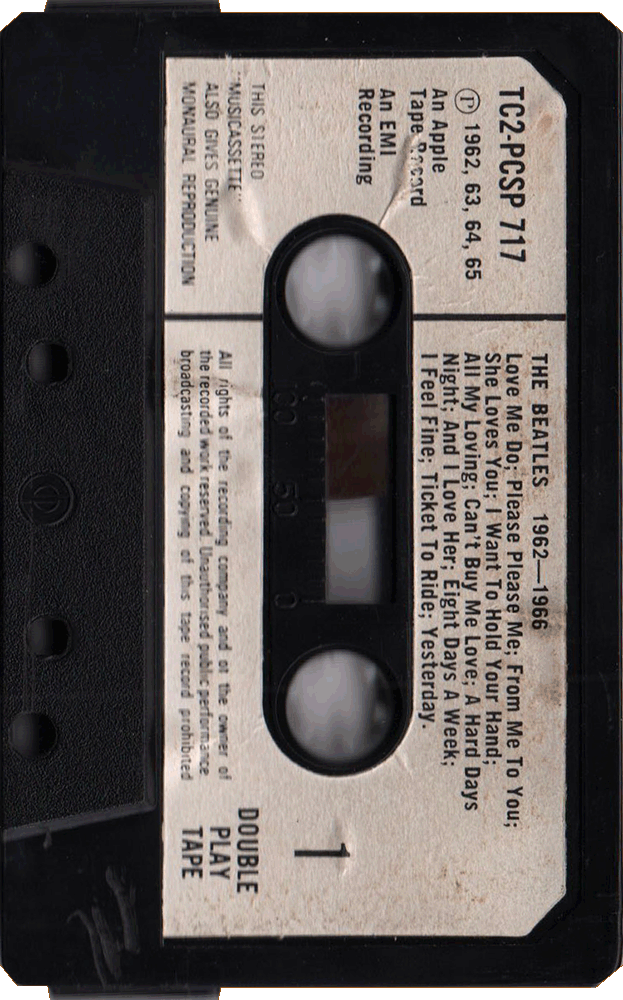 |
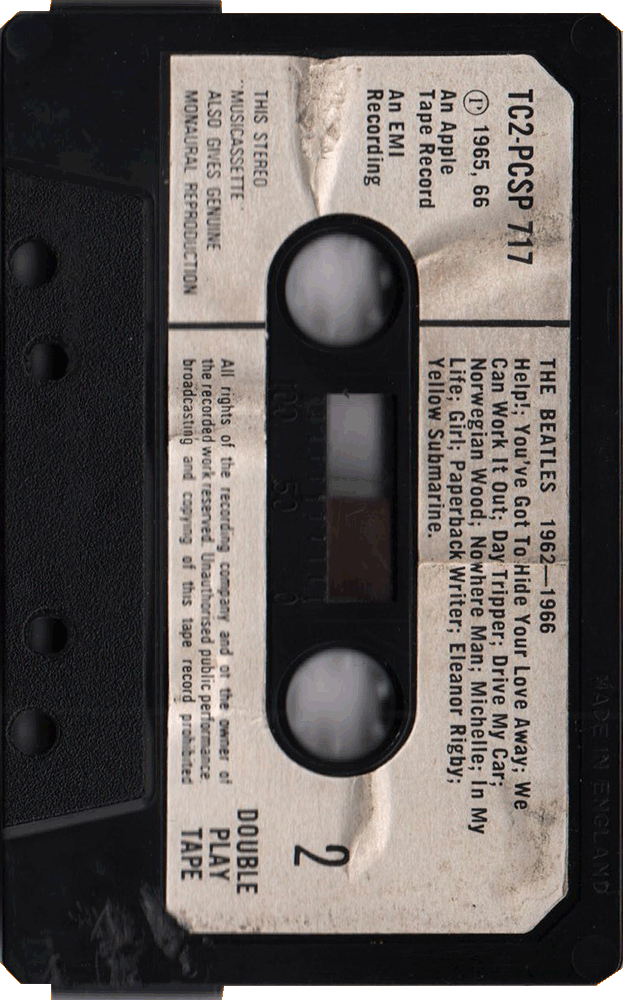 |
|
| The cassette cases ("Norelco" cases)
were clear plastic at the front and around the spine area,
and black plastic at the rear. |
This UK issue has White
paper
label on black shell. |
|||
| INLAY |
INLAY: FRONT | INLAY: INSIDE |
||
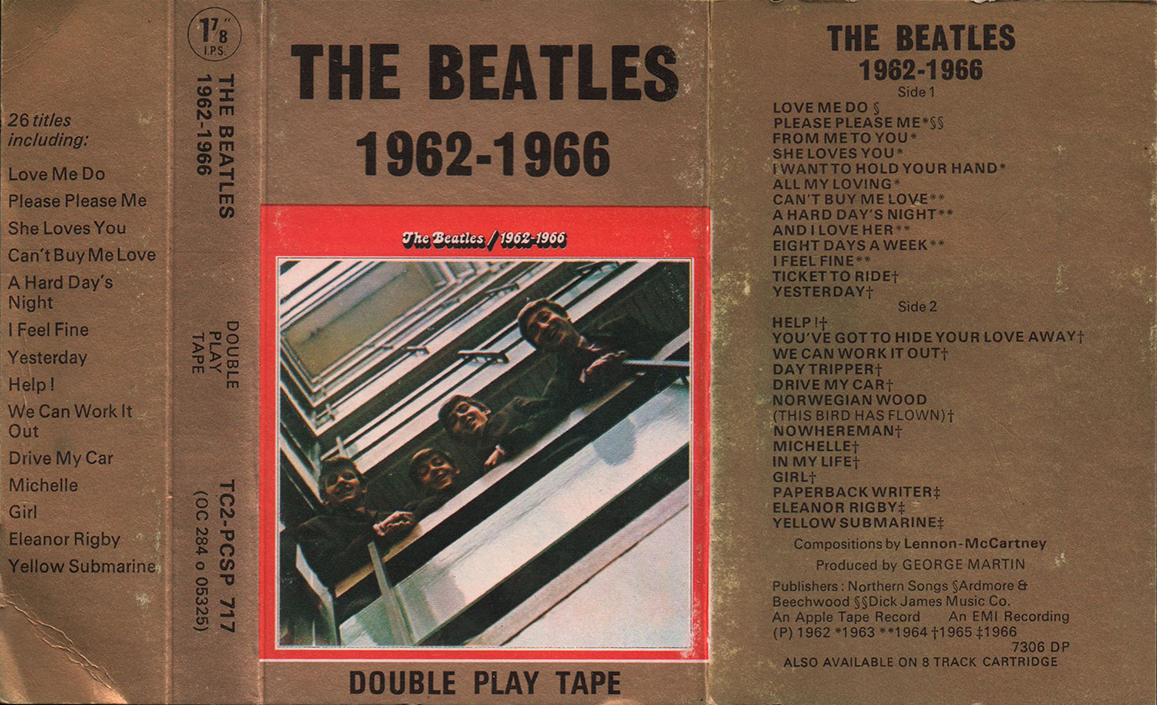 |
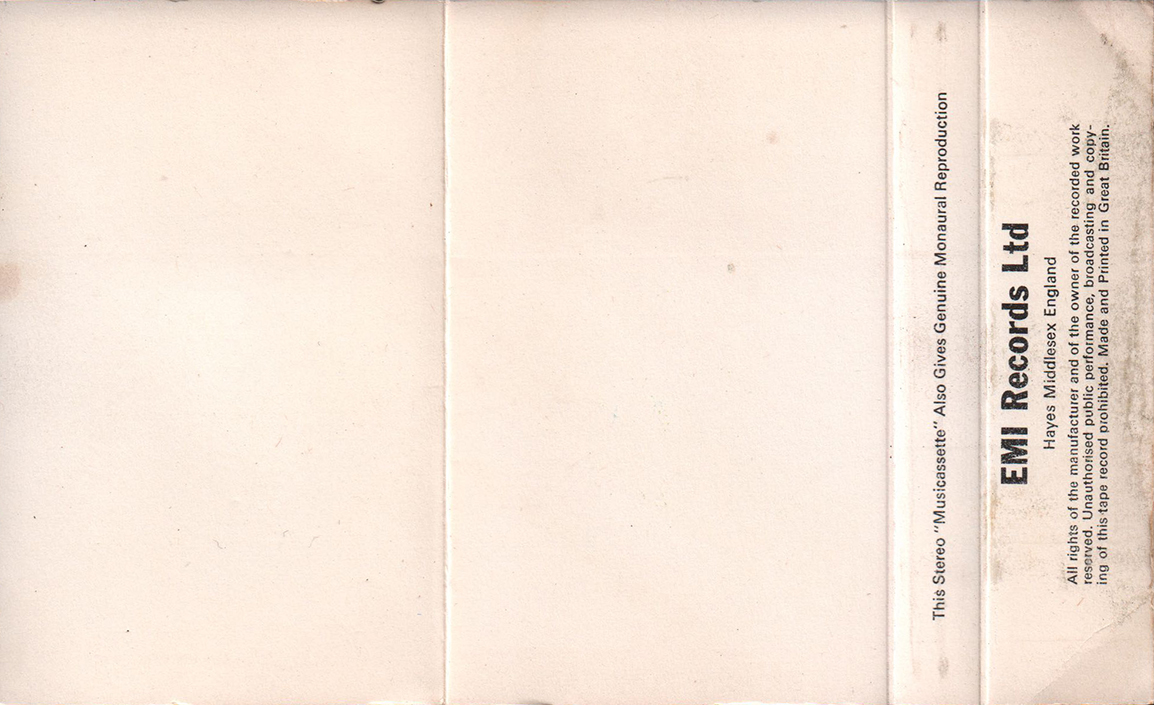 |
|||
| EMI metallic effect "Gold Top" cassette
inlay Type-2: without Apple logomark. "EMI Records Ltd." was printed on the back of the inlay. ”Gold Top inlay" are believed to have been introduced in January 1972. |
||||
| INLAY: FRONT CLOSE UP | ||||
 |
 |
 |
The circular 1
7/8 " I.P.S. mark was printed at the spine. Apple logo was NOT printed on the inlay. EMI metallic effect "Gold Top" cassette inlay. |
|
| INLAY: FRONT CLOSE UP | ||||
 |
 |
|||
| EMI originally issued the Beatles
UK albums on cassette tape with re-arranged running orders,
the excuse being the need to have two sides of equal length
to avoid the problem of listeners stopping the tape at the
end of one side and turning over to start mid-way through
the opening track on the reverse. The cassette of the album "1962-1966" is recorded in the same order as the LP. |
||||
| INLAY: INSIDE CLOSE UP | ||||
 |
Catalog number "TC2-PCSP 717" and the EMI country code (*1) were printed on the inlay. |  |
Printer company's name "7306 DP(**)" was printed at the bottom of the inlay. | |
| INLAY: INSIDE CLOSE UP | ||||
 |
Gold top
inlay type-2: "EMI Records Ltd." credit was printed at the bottom of the inside of the inlay. |
|||
| LABEL CLOSE UP | ||||
 |
 |
 |
 |
|
| The cassettes
was issued NO Apple logo. The words "An Apple Tape Record" was printed on the label. |
Containing content as a prerecorded cassette is called "Musicassette" | dp(**) mark was moulded into cassette shells. | ||
| LABEL CLOSE UP | ||||
| SIDE
1 |
SIDE 2 |
The
cassette
of
the album "1962-1966" is recorded in the same order as the
LP. |
||
 |
 |
|||
| LABEL CLOSE UP | ||||
 |
 |
 |
||
| The words "Double Play Tape" was
printed on the label. Side-1: "Made in England/ Made in U.S.A." was NOT embossed the shell. Side-2: "MADE IN ENGLAND" was embossed the shell. |
||||
| OTHER ITEM | ||||
| - |
||||
| LABEL | White Paper Label on Black Shell without
Parlophone logo |
|||
| MIX | STEREO except as noted |
|||
| RECORD COMPANY'S NAME | EMI Records Ltd. / An E.M.I.
Recording / An Apple Tape Record |
|||
| CENTRAL REMARK "SOLD IN U.K." |
- | |||
| RECORDING PUBLISHED CREDIT | (P) 1962, 63,64,65,66 |
|||
| INLAY FORM | Metallic effect gold inlay Type-2
(Foldover) |
|||
| SHELL | Black Shell / embossed
"MADE IN ENGLAND" and "dp" logo mark |
|||
| CASSETTE CASE |
"Norelco"
cases:
clear
plastic at the front and around the spine area, and black
plastic at the rear. |
|||
| PRINTER CREDIT | Made and Printed in Great Britain / 7306
DP (Deta Packing) |
|||
| COVER DESIGN/ PHOTO/ NOTES | The album cover was designed by Tom
Wilkes. photographer: Angus McBean |
|||
| PRODUCER | George Martin | |||
| COMMENTS | White paper label without
Parlophone logo on Black shell cassette, with its
original inlay and case. "Gold Top inlay” are believed to have been introduced in January 1972. The G&L notation on the inside inlay indicates the printer's initials (Ernest J Day, Garrod & Lofthouse, or Data Packaging). EMI used the same metallic gold inlay design for the "1962-1966" and the “1967-1970” cassette issue, right up until 93, and didn’t issue a Ochre (lighter-brown) version during the 77-83 period. (maybe) Gold top inlay type-2: "EMI Records Ltd." credit was printed at the bottom of the inside of the inlay. The EMI UK catalog no. (TC2-PCSP-717) was on the spine. The cassette cases ("Norelco" cases) were clear plastic at the front and around the spine area, and black plastic at the rear. (*1) EMI country code: 0C 284 o 05325 The EMI country codes (introduced on 1 June, 1969): In most cases the EMI Codes are the first two letters of the record's catalog#. These EMI Country Codes were used to indicate the country in which the record was pressed. Note this doesn't necessarily means the record was also released in that country (from Discog). OC / 0C / 1E= UK (**)Data Packaging Corporation: (who also traded as Hellerman Data Packaging Ltd) supplied cassette and 8 track shells, tape and other components to the music industry. The "DP" logo can often be found moulded into cassette shells, especially during the early to mid 1970s. |
|||
|
TITLE
|
THE BEATLES
1962-1966 |
|||
| CATALOG NUMBER | TC2-PCSP 717 / 0C 284 o 05325 |
|||
|
RELEASE DATE
|
l1974? / 3rd Issue? | |||
| TRACK LISTING | SIDE 1 | SIDE 2 | ||
| Love Me Do (sim. stereo) |
Help |
|||
| Please Please Me |
You've Got To Hide Your Love Away |
|||
| From Me To You |
We Can Work It Out |
|||
| She Loves You (sim. stereo) |
Day Tripper |
|||
| I Want To Hold Your Hand |
Drive My Car |
|||
| All My Loving |
Norwegian Wood (This Bird Has
Flown) |
|||
| Can't Buy Me Love |
Nowhere Man |
|||
| A Hard Days Night |
Michelle |
|||
| And I Love Her |
In My Life |
|||
| Eight days a week |
Girl |
|||
| I Feel Fine |
Paperback Writer |
|||
| Ticket To Ride |
Eleanor Rigby |
|||
| Yesterday | Yellow Submarine | |||
| CASSETTE CASE AND TAPE |
CASE FRONT | CASE BACK | SIDE 1 --> Click! | SIDE 2 --> Click! |
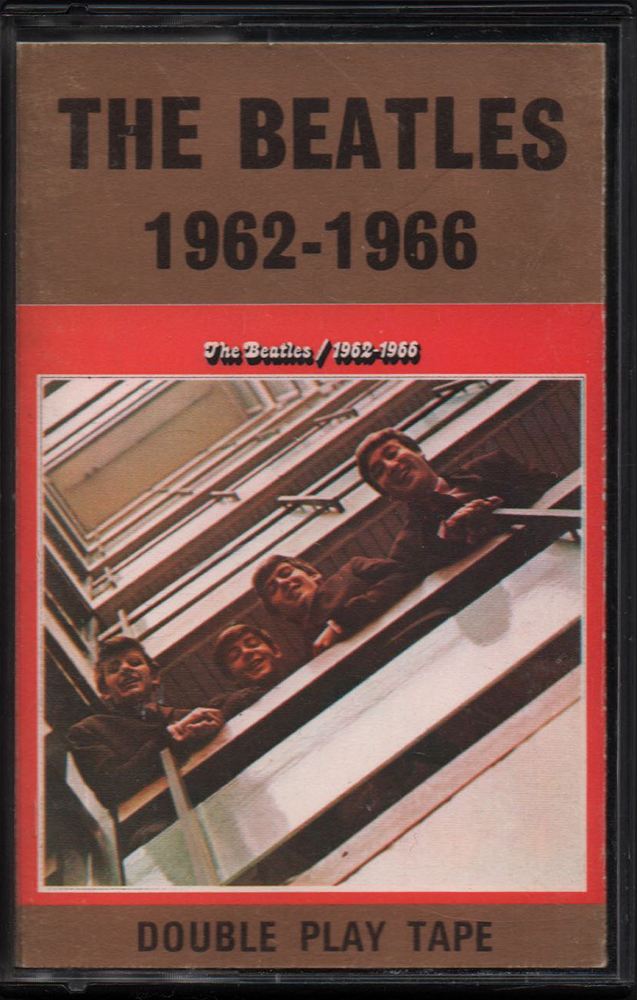 |
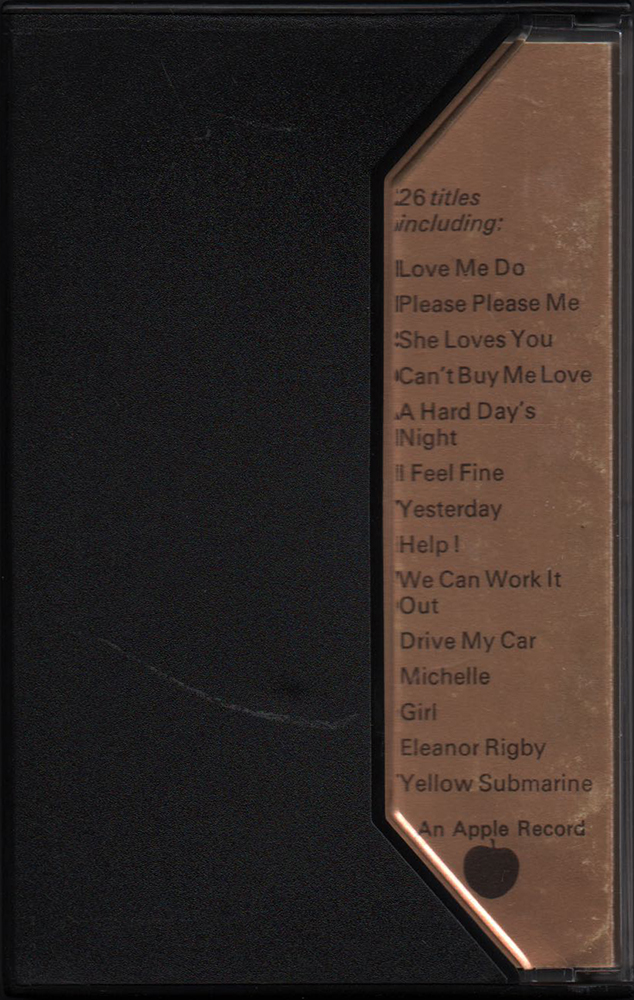 |
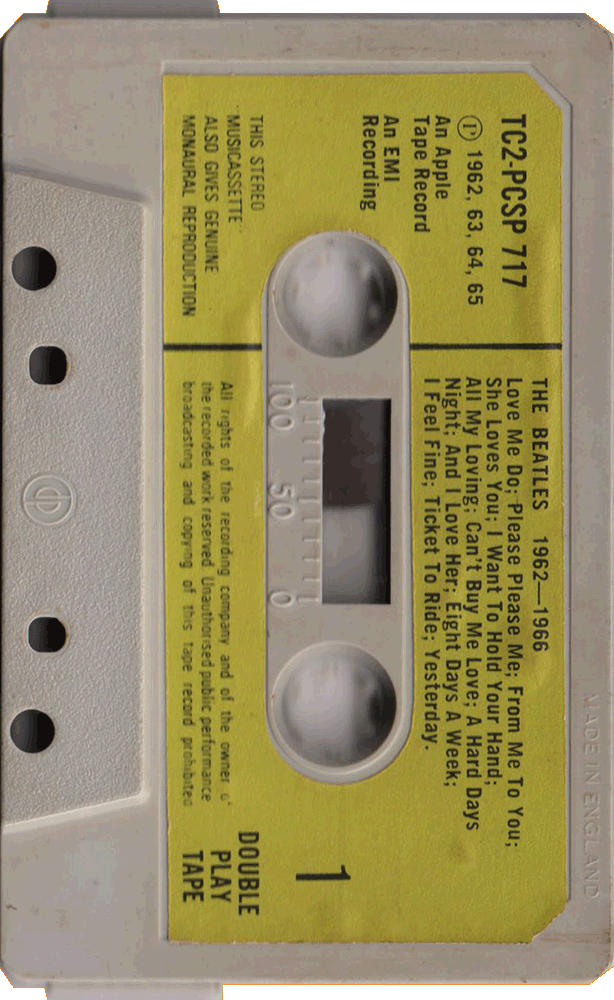 |
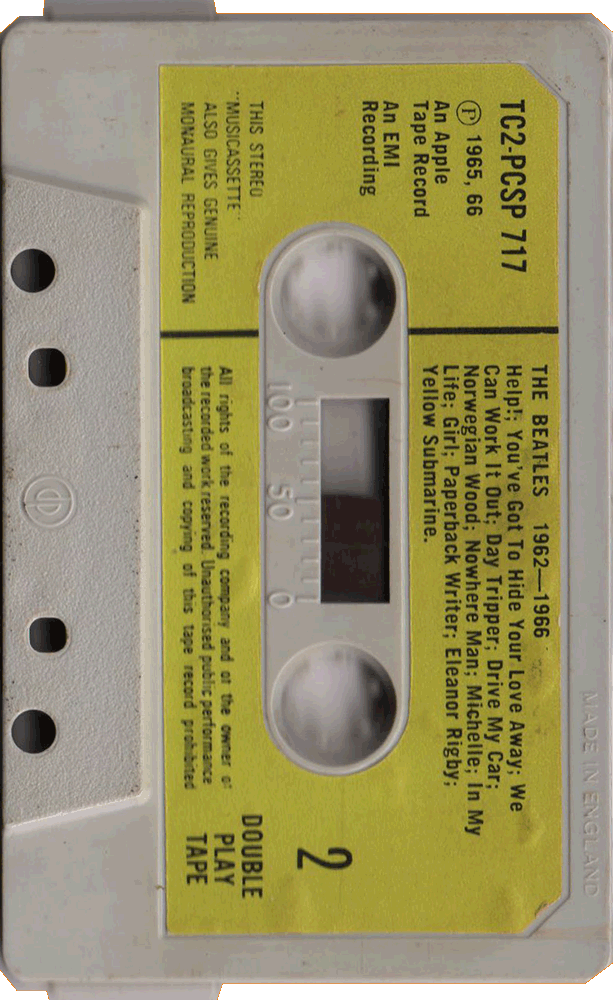 |
|
| The cassette cases ("Norelco" cases)
were clear plastic at the front and around the spine area,
and black plastic at the rear. |
This UK issue has Lemon
Yellow
paper
label on light grey shell. |
|||
| INLAY |
INLAY: FRONT | INLAY: INSIDE |
||
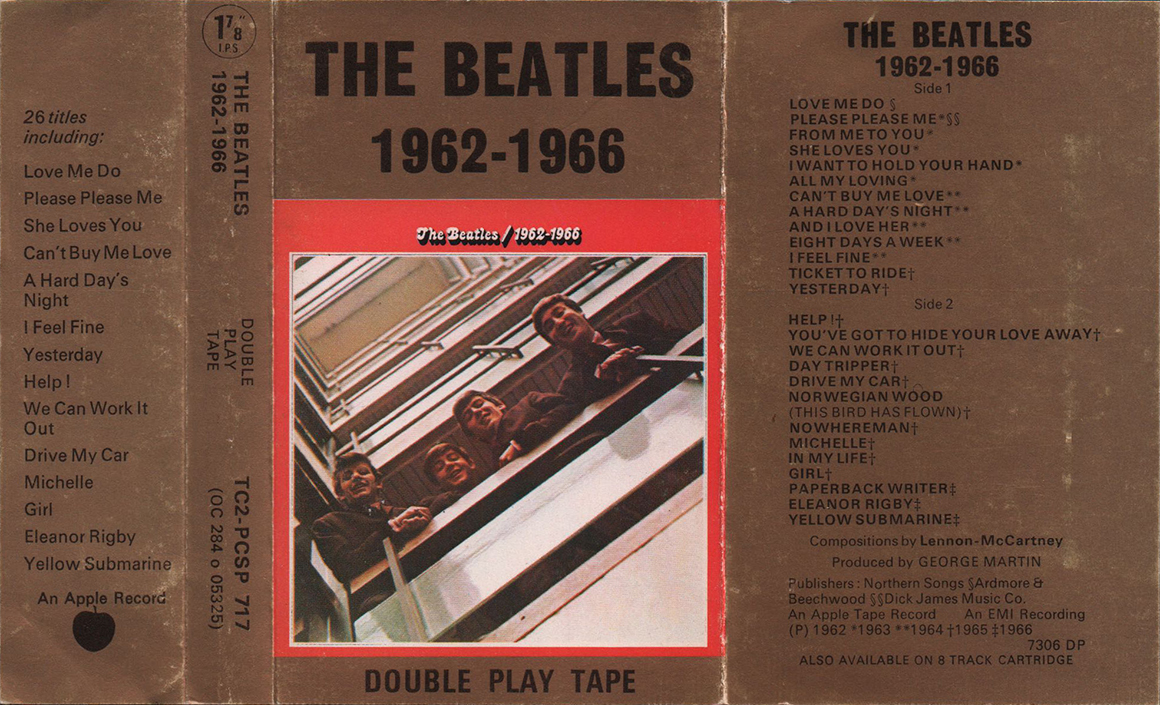 |
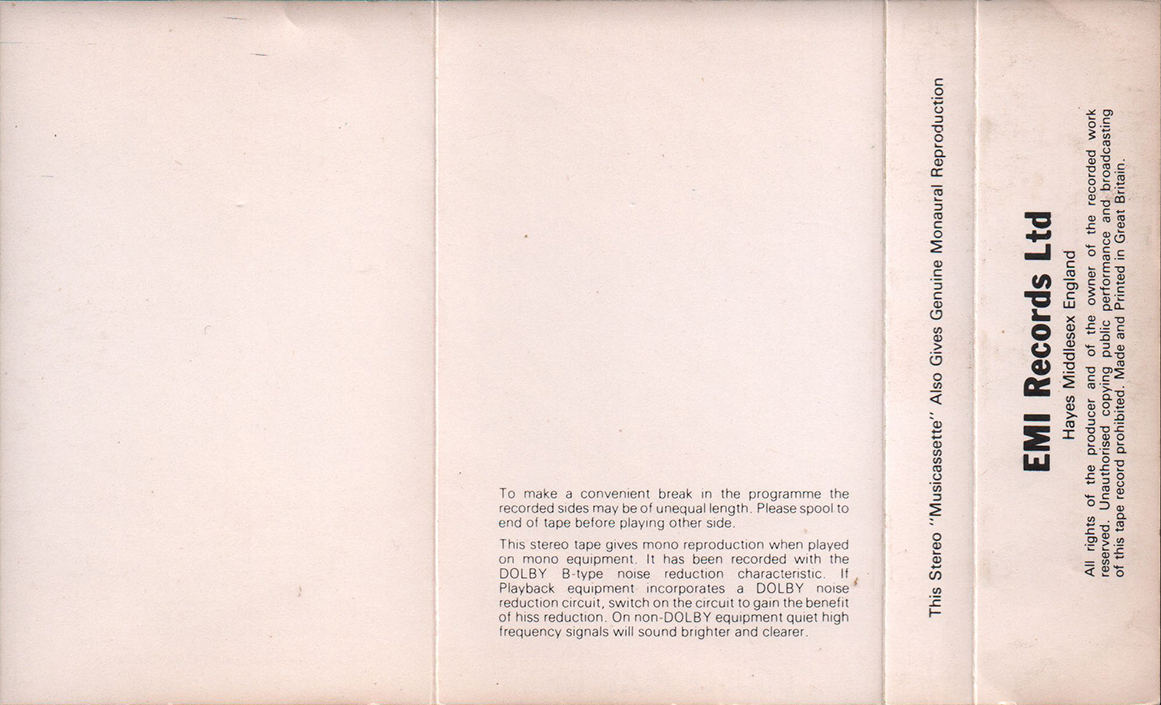 |
|||
| EMI metallic effect "Gold Top" cassette
inlay Type-3': with Apple logomark. "EMI Records Ltd." was printed on the back of the inlay. The phrase "It has been recorded with the DOLBY B-type noise reduction characteristic" was printed on the inlay. ”Gold Top inlay" are believed to have been introduced in January 1972. |
||||
| INLAY: FRONT CLOSE UP | ||||
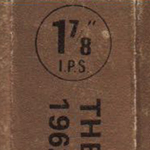 |
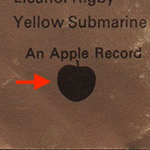 |
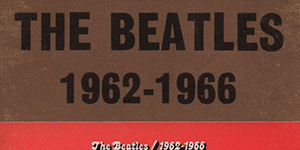 |
The circular 1
7/8 " I.P.S. mark was printed at the spine. Apple logo was printed on the inlay. EMI metallic effect "Gold Top" cassette inlay. |
|
| INLAY: FRONT CLOSE UP | ||||
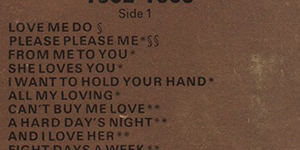 |
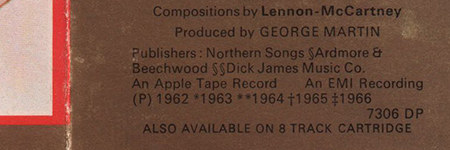 |
|||
| EMI originally issued the Beatles
UK albums on cassette tape with re-arranged running orders,
the excuse being the need to have two sides of equal length
to avoid the problem of listeners stopping the tape at the
end of one side and turning over to start mid-way through
the opening track on the reverse. The cassette of the album "1962-1966" is recorded in the same order as the LP. |
||||
| INLAY: INSIDE CLOSE UP | ||||
 |
Catalog number "TC2-PCSP 717" and the EMI country code (*1) were printed on the inlay. |  |
Printer company's name "7306 DP(**)" was printed at the bottom of the inlay. | |
| INLAY: INSIDE CLOSE UP | ||||
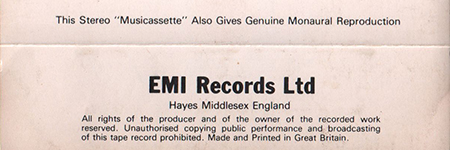 |
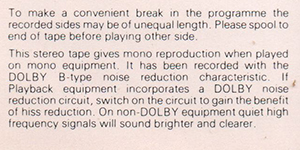 |
|||
| Gold top inlay
type-3': "EMI Records Ltd." credit was printed at the bottom of the inside of the inlay. |
The phrase "It has
been recorded with the DOLBY B-type noise reduction
characteristic" was printed on the inlay. |
|||
| LABEL CLOSE UP | ||||
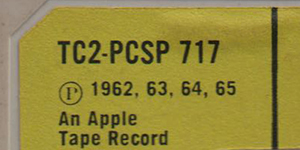 |
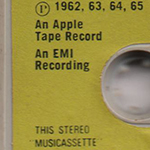 |
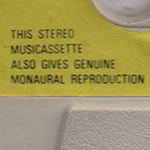 |
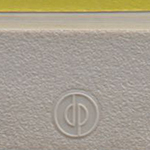 |
|
| The cassettes
was issued NO Apple logo. The words "An Apple Tape Record" was printed on the label. |
Containing content as a prerecorded cassette is called "Musicassette" | dp(**) mark was moulded into cassette shells. | ||
| LABEL CLOSE UP | ||||
| SIDE
1 |
SIDE 2 |
The
cassette
of
the album "1962-1966" is recorded in the same order as the
LP. |
||
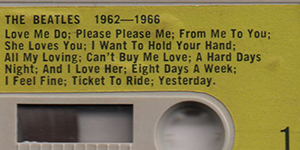 |
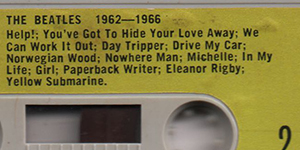 |
|||
| LABEL CLOSE UP | ||||
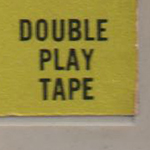 |
 |
 |
||
| The words "Double Play Tape" was
printed on the label. "MADE IN ENGLAND" was embossed the shell on both sides. |
||||
| OTHER ITEM | ||||
| - |
||||
| LABEL | Lemon Yellow Paper Label on light grey Shell without Parlophone logo | |||
| MIX | STEREO except as noted |
|||
| RECORD COMPANY'S NAME | EMI Records Ltd. / An E.M.I.
Recording / An Apple Tape Record |
|||
| CENTRAL REMARK "SOLD IN U.K." |
- | |||
| RECORDING PUBLISHED CREDIT | (P) 1962, 63,64,65,66 |
|||
| INLAY FORM | Metallic effect gold inlay Type-3' error
sleeve with Dolby credit (Foldover) |
|||
| SHELL | Light Grey Shell / embossed "MADE
IN ENGLAND" and "dp" logo mark |
|||
| CASSETTE CASE |
"Norelco"
cases:
clear
plastic at the front and around the spine area, and black
plastic at the rear. |
|||
| PRINTER CREDIT | Made and Printed in Great Britain / 7306
DP (Deta Packing) |
|||
| COVER DESIGN/ PHOTO/ NOTES | The album cover was designed by Tom
Wilkes. photographer: Angus McBean |
|||
| PRODUCER | George Martin | |||
| COMMENTS | Lemon Yellow paper label
without Parlophone logo on Light grey shell cassette,
with its original inlay and case. "Gold Top inlay” are believed to have been introduced in January 1972. The G&L notation on the inside inlay indicates the printer's initials (Ernest J Day, Garrod & Lofthouse, or Data Packaging). EMI used the same metallic gold inlay design for the "1962-1966" and the “1967-1970” cassette issue, right up until 93, and didn’t issue a Ochre (lighter-brown) version during the 77-83 period. (maybe) Gold top inlay type-3': "EMI Records Ltd." credit was printed at the bottom of the inside of the inlay. with Apple logo and with Dolby credit. The EMI UK catalog no. (TC2-PCSP-717) was on the spine. The cassette cases ("Norelco" cases) were clear plastic at the front and around the spine area, and black plastic at the rear. (*1) EMI country code: 0C 284 o 05325 The EMI country codes (introduced on 1 June, 1969): In most cases the EMI Codes are the first two letters of the record's catalog#. These EMI Country Codes were used to indicate the country in which the record was pressed. Note this doesn't necessarily means the record was also released in that country (from Discog). OC / 0C / 1E= UK (**)Data Packaging Corporation: (who also traded as Hellerman Data Packaging Ltd) supplied cassette and 8 track shells, tape and other components to the music industry. The "DP" logo can often be found moulded into cassette shells, especially during the early to mid 1970s. |
|||
|
TITLE
|
THE BEATLES
1962-1966 |
|||
| CATALOG NUMBER | TC2-PCSP 717 / 0C 284 o 05325 |
|||
|
RELEASE DATE
|
1975? / 4th. Issue? (First Press: June 1973) | |||
| TRACK LISTING | SIDE 1 | SIDE 2 | ||
| Love Me Do (sim. stereo) |
Help |
|||
| Please Please Me |
You've Got To Hide Your Love Away |
|||
| From Me To You |
We Can Work It Out |
|||
| She Loves You (sim. stereo) |
Day Tripper |
|||
| I Want To Hold Your Hand |
Drive My Car |
|||
| All My Loving |
Norwegian Wood (This Bird Has
Flown) |
|||
| Can't Buy Me Love |
Nowhere Man |
|||
| A Hard Days Night |
Michelle |
|||
| And I Love Her |
In My Life |
|||
| Eight days a week |
Girl |
|||
| I Feel Fine |
Paperback Writer |
|||
| Ticket To Ride |
Eleanor Rigby |
|||
| Yesterday | Yellow Submarine | |||
| CASSETTE CASE AND TAPE |
CASE FRONT | CASE BACK | SIDE 1 --> Click! | SIDE 2 --> Click! |
 |
 |
 |
 |
|
| The cassette cases ("Norelco" cases)
were clear plastic at the front and around the spine area,
and black plastic at the rear. |
This UK issue has White
paper
label on Black Shell. |
|||
| INLAY |
INLAY: FRONT | INLAY: INSIDE |
||
 |
 |
|||
| EMI metallic effect "Gold Top" cassette
inlay Type-3: with Apple logomark. "EMI Records Ltd." was printed on the back of the inlay. ”Gold Top inlay" are believed to have been introduced in January 1972. |
||||
| INLAY: FRONT CLOSE UP | ||||
 |
 |
 |
The circular 1
7/8 " I.P.S. mark was printed at the spine. Apple logo was added on the inlay. EMI metallic effect "Gold Top" cassette inlay. |
|
| INLAY: FRONT CLOSE UP | ||||
 |
 |
|||
| EMI originally issued the Beatles
UK albums on cassette tape with re-arranged running orders,
the excuse being the need to have two sides of equal length
to avoid the problem of listeners stopping the tape at the
end of one side and turning over to start mid-way through
the opening track on the reverse. The cassette of the album "1962-1966" is recorded in the same order as the LP. |
||||
| INLAY: INSIDE CLOSE UP | ||||
 |
Catalog number "TC2-PCSP 717" and the EMI country code (*1) were printed on the inlay. |  |
Printer company's name "7306 DP(**)" was printed at the bottom of the inlay. | |
| INLAY: INSIDE CLOSE UP | ||||
 |
Gold top
inlay type-3: "EMI Records Ltd." credit was printed at the bottom of the inside of the inlay. |
|||
| LABEL CLOSE UP | ||||
 |
 |
 |
 |
|
| The cassettes
was issued NO Apple logo. The words "An Apple Tape Record" was printed on the label. |
Containing content as a prerecorded cassette is called "Musicassette" | No mark was moulded into cassette shells. | ||
| LABEL CLOSE UP | ||||
| SIDE
1 |
SIDE 2 |
The
cassette
of the album "1962-1966" is recorded in the same order as
the LP. |
||
 |
 |
|||
| LABEL CLOSE UP | ||||
 |
"Made
in
England" was embossed the shell on both sides. |
|||
| OTHER ITEM | ||||
| - |
||||
| LABEL | White Paper Label on Black Shell without
Parlophone logo |
|||
| MIX | STEREO except as noted |
|||
| RECORD COMPANY'S NAME | EMI Records Ltd. / An E.M.I. Recording /
An Apple Tape Record |
|||
| CENTRAL REMARK "SOLD IN U.K." |
- | |||
| RECORDING PUBLISHED CREDIT | (P) 1962, 63,64,65,66 |
|||
| INLAY FORM | Metallic effect gold inlay Type-3 with
Apple logo (Foldover) |
|||
| SHELL | Black Shell / embossed "MADE IN
ENGLAND" |
|||
| CASSETTE CASE |
"Norelco"
cases:
clear plastic at the front and around the spine area, and
black plastic at the rear. |
|||
| PRINTER CREDIT | Made and Printed in Great Britain / 7306
DP (Deta Packing) |
|||
| COVER DESIGN/ PHOTO/ NOTES | The album cover was designed by Tom
Wilkes. photographer: Angus McBean |
|||
| PRODUCER | George Martin | |||
| COMMENTS | White paper label without
Parlophone logo on black shell cassette, with its original
inlay and case. "Gold Top inlay” are believed to have been introduced in January 1972. The G&L notation on the inside inlay indicates the printer's initials (Ernest J Day, Garrod & Lofthouse, or Data Packaging). EMI used the same metallic gold inlay design for the "1962-1966" and the “1967-1970” cassette issue, right up until 93, and didn’t issue a Ochre (lighter-brown) version during the 77-83 period. (maybe) The EMI UK catalog no. (TC2-PCSP-717) was on the spine. Added the Apple logomark and the words "An Apple Record" on the inlay. Gold top inlay type-3: "EMI Records Ltd." credit was printed at the bottom of the inside of the inlay. The cassette cases ("Norelco" cases) were clear plastic at the front and around the spine area, and black plastic at the rear. (*1) EMI country code: 0C 284 o 05325 The EMI country codes (introduced on 1 June, 1969): In most cases the EMI Codes are the first two letters of the record's catalog#. These EMI Country Codes were used to indicate the country in which the record was pressed. Note this doesn't necessarily means the record was also released in that country (from Discog). OC / 0C / 1E= UK (**)Data Packaging Corporation: (who also traded as Hellerman Data Packaging Ltd) supplied cassette and 8 track shells, tape and other components to the music industry. The "DP" logo can often be found moulded into cassette shells, especially during the early to mid 1970s. |
|||
|
TITLE
|
THE BEATLES
1962-1966 |
|||
| CATALOG NUMBER | TC2-PCSP 717 / 0C 284 o 05325 |
|||
|
RELEASE DATE
|
1977? / 6th. Issue? (First Press: June 1973) | |||
| TRACK LISTING | SIDE 1 | SIDE 2 | ||
| Love Me Do (sim. stereo) |
Help |
|||
| Please Please Me |
You've Got To Hide Your Love Away |
|||
| From Me To You |
We Can Work It Out |
|||
| She Loves You (sim. stereo) |
Day Tripper |
|||
| I Want To Hold Your Hand |
Drive My Car |
|||
| All My Loving |
Norwegian Wood (This Bird Has
Flown) |
|||
| Can't Buy Me Love |
Nowhere Man |
|||
| A Hard Days Night |
Michelle |
|||
| And I Love Her |
In My Life |
|||
| Eight days a week |
Girl |
|||
| I Feel Fine |
Paperback Writer |
|||
| Ticket To Ride |
Eleanor Rigby |
|||
| Yesterday | Yellow Submarine | |||
| CASSETTE CASE AND TAPE |
CASE FRONT | CASE BACK | SIDE 1 --> Click! | SIDE 2 --> Click! |
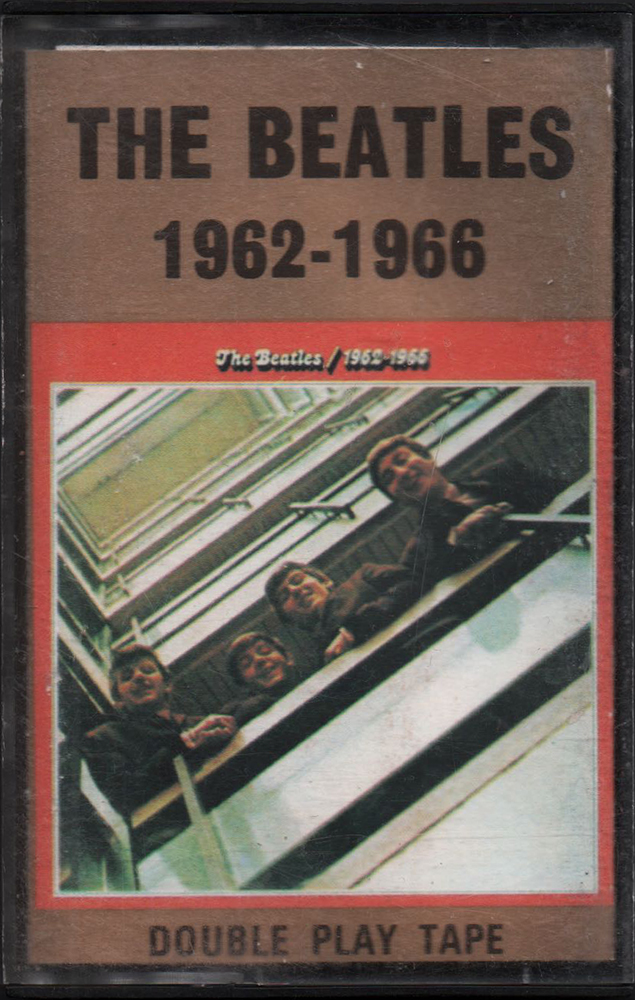 |
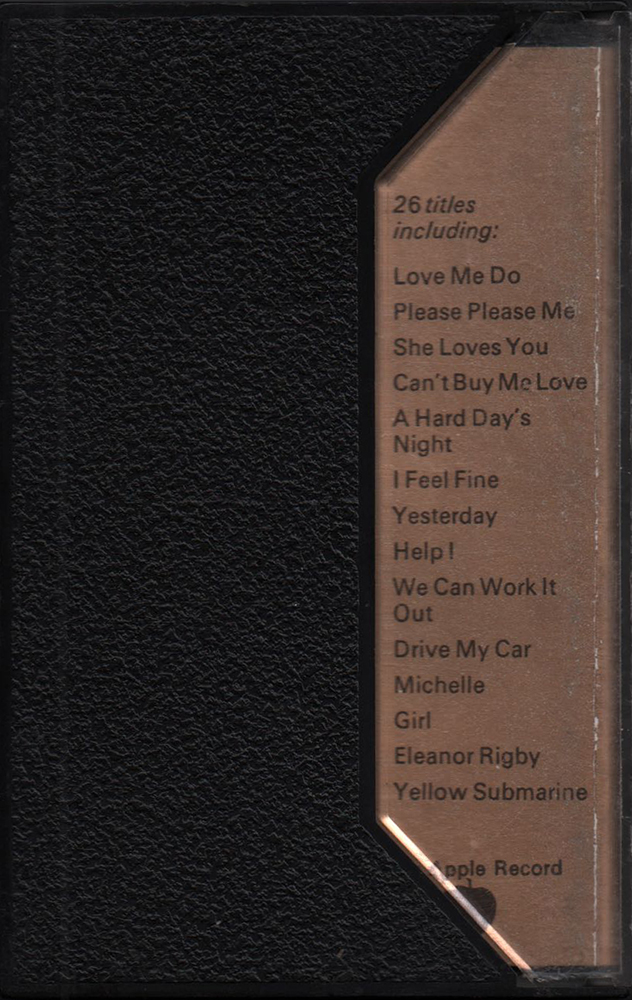 |
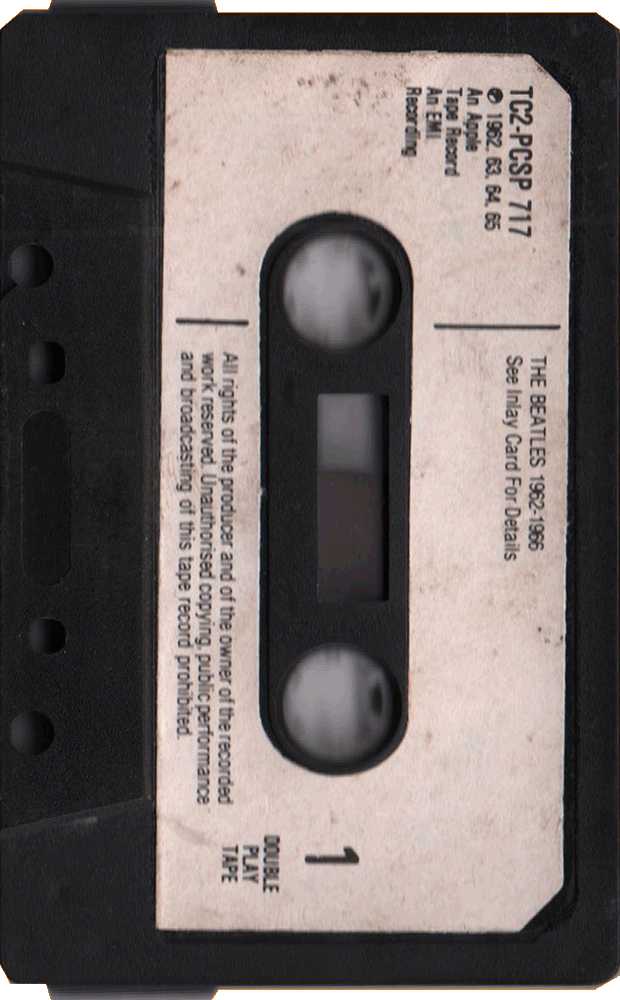 |
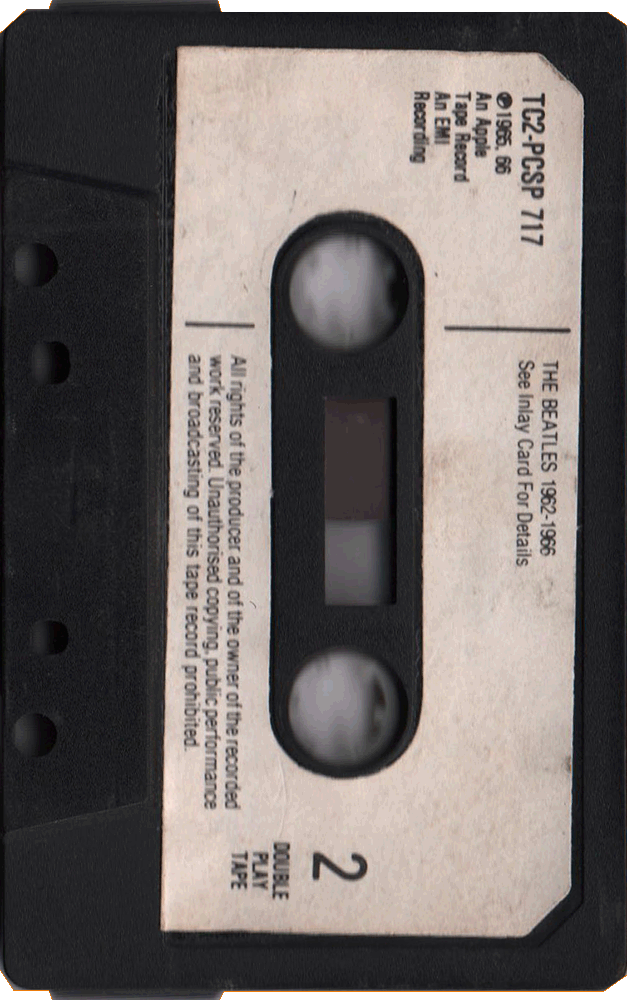 |
|
| The cassette cases ("Norelco" cases)
were clear plastic at the front and around the spine area,
and black plastic at the rear. |
This UK issue has White
paper label on Black Shell. |
|||
| INLAY |
INLAY: FRONT | INLAY: INSIDE |
||
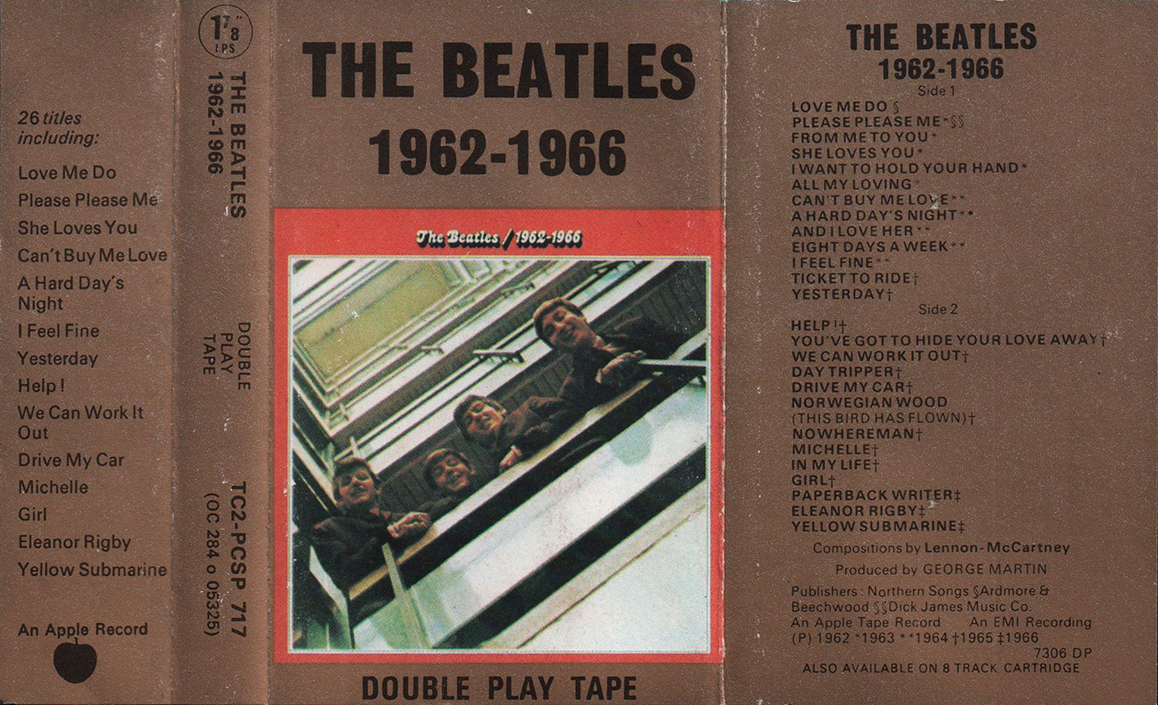 |
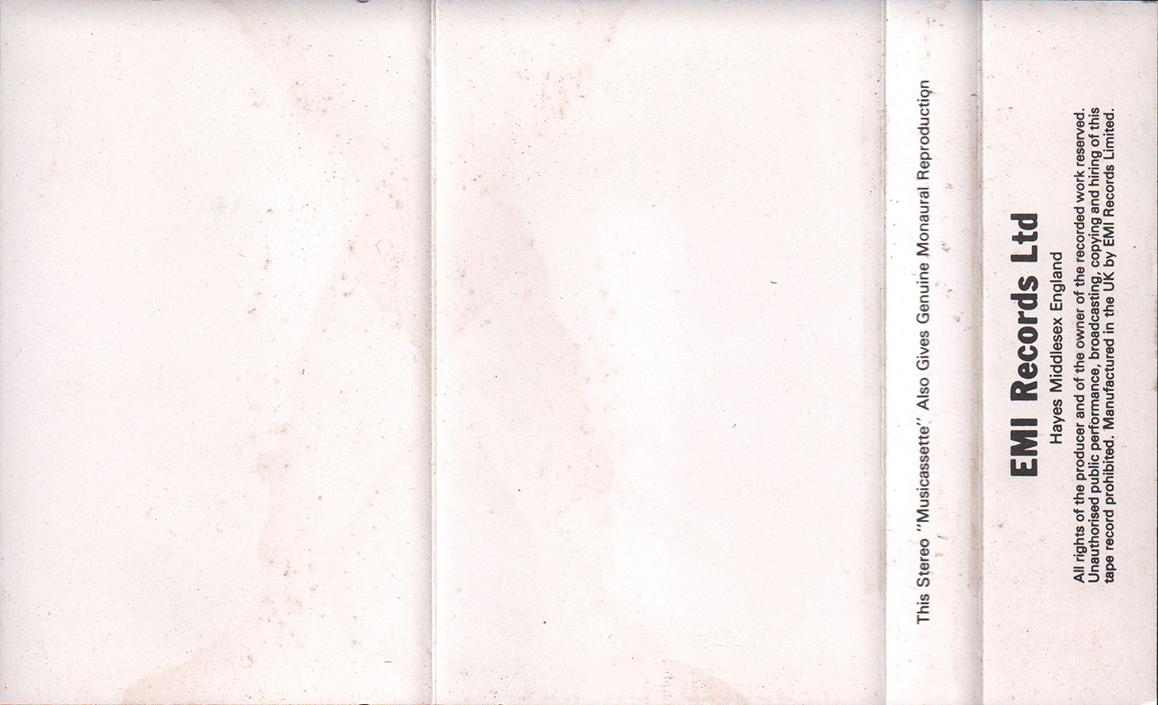 |
|||
| EMI metallic effect "Gold Top" cassette
inlay Type-3: with Apple logomark. "EMI Records Ltd." was printed on the back of the inlay. ”Gold Top inlay" are believed to have been introduced in January 1972. |
||||
| INLAY: FRONT CLOSE UP | ||||
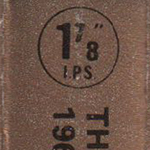 |
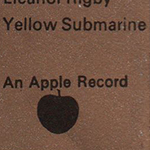 |
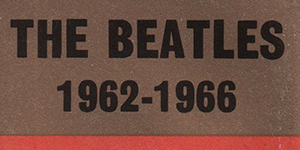 |
The circular 1
7/8 " I.P.S. mark was printed at the spine. Apple logo was added on the inlay. EMI metallic effect "Gold Top" cassette inlay. |
|
| INLAY: FRONT CLOSE UP | ||||
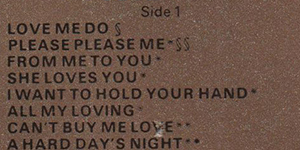 |
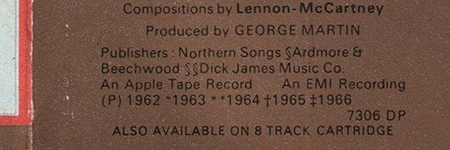 |
|||
| EMI originally issued the Beatles
UK albums on cassette tape with re-arranged running orders,
the excuse being the need to have two sides of equal length
to avoid the problem of listeners stopping the tape at the
end of one side and turning over to start mid-way through
the opening track on the reverse. The cassette of the album "1962-1966" is recorded in the same order as the LP. |
||||
| INLAY: INSIDE CLOSE UP | ||||
 |
Catalog number "TC2-PCSP 717" and the EMI country code (*1) were printed on the inlay. |  |
Printer company's name "7306 DP(**)" was printed at the bottom of the inlay. | |
| INLAY: INSIDE CLOSE UP | ||||
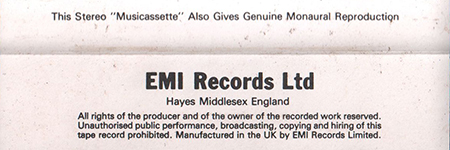 |
Gold top
inlay type-3: "EMI Records Ltd." credit was printed at the bottom of the inside of the inlay. |
|||
| LABEL CLOSE UP | ||||
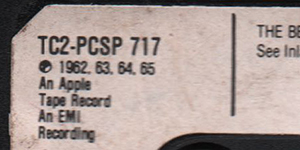 |
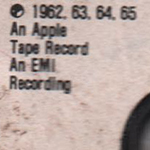 |
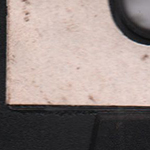 |
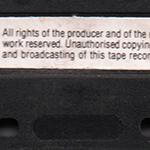 |
|
| The cassettes
was issued NO Apple logo. The words "An Apple Tape Record" was printed on the label. |
The "Musicassette" notation has been removed, | No mark was moulded into cassette shells. | ||
| LABEL CLOSE UP | ||||
| SIDE
1 |
SIDE 2 |
No
track list appear on the cassette label(See inlay card for
details). The cassette of the album "1962-1966" is recorded in the same order as the LP. |
||
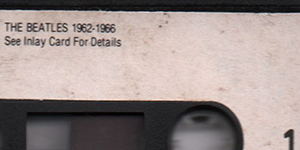 |
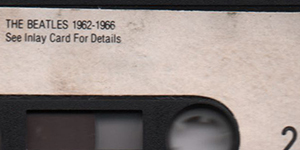 |
|||
| LABEL CLOSE UP | ||||
 |
"Made
in
England"
was not embossed the shell on both sides. |
|||
| OTHER ITEM | ||||
| - |
||||
| LABEL | White Paper Label on Black Shell without
Parlophone logo |
|||
| MIX | STEREO except as noted |
|||
| RECORD COMPANY'S NAME | EMI Records Ltd. / An E.M.I. Recording /
An Apple Tape Record |
|||
| CENTRAL REMARK "SOLD IN U.K." |
- | |||
| RECORDING PUBLISHED CREDIT | (P) 1962, 63,64,65,66 |
|||
| INLAY FORM | Metallic effect gold inlay Type-3 with
Apple logo (Foldover) |
|||
| SHELL | Black Shell Type-3 |
|||
| CASSETTE CASE |
"Norelco"
cases:
clear
plastic at the front and around the spine area, and black
plastic at the rear. |
|||
| PRINTER CREDIT | Made and Printed in Great Britain / 7306
DP (Deta Packing) |
|||
| COVER DESIGN/ PHOTO/ NOTES | The album cover was designed by Tom
Wilkes. photographer: Angus McBean |
|||
| PRODUCER | George Martin | |||
| COMMENTS | White paper label without
Parlophone logo on black shell cassette, with its original
inlay and case. No track list appear on the cassette label (See inlay card for details). "Gold Top inlay” are believed to have been introduced in January 1972. The G&L notation on the inside inlay indicates the printer's initials (Ernest J Day, Garrod & Lofthouse, or Data Packaging). EMI used the same metallic gold inlay design for the "1962-1966" and the “1967-1970” cassette issue, right up until 93, and didn’t issue a Ochre (lighter-brown) version during the 77-83 period. (maybe) The EMI UK catalog no. (TC2-PCSP-717) was on the spine. Added the Apple logomark and the words "An Apple Record" on the inlay. Gold top inlay type-3: "EMI Records Ltd." credit was printed at the bottom of the inside of the inlay. The cassette cases ("Norelco" cases) were clear plastic at the front and around the spine area, and black plastic at the rear. (*1) EMI country code: 0C 284 o 05325 The EMI country codes (introduced on 1 June, 1969): In most cases the EMI Codes are the first two letters of the record's catalog#. These EMI Country Codes were used to indicate the country in which the record was pressed. Note this doesn't necessarily means the record was also released in that country (from Discog). OC / 0C / 1E= UK (**)Data Packaging Corporation: (who also traded as Hellerman Data Packaging Ltd) supplied cassette and 8 track shells, tape and other components to the music industry. The "DP" logo can often be found moulded into cassette shells, especially during the early to mid 1970s. |
|||
|
TITLE
|
THE BEATLES
1962-1966 |
|||
| CATALOG NUMBER | TC2-PCSP 717 / 0C 284 o 05325 |
|||
|
RELEASE DATE
|
1977? / 7th Issue? | |||
| TRACK LISTING | SIDE 1 | SIDE 2 | ||
| Love Me Do (sim. stereo) |
Help |
|||
| Please Please Me |
You've Got To Hide Your Love Away |
|||
| From Me To You |
We Can Work It Out |
|||
| She Loves You (sim. stereo) |
Day Tripper |
|||
| I Want To Hold Your Hand |
Drive My Car |
|||
| All My Loving |
Norwegian Wood (This Bird Has
Flown) |
|||
| Can't Buy Me Love |
Nowhere Man |
|||
| A Hard Days Night |
Michelle |
|||
| And I Love Her |
In My Life |
|||
| Eight days a week |
Girl |
|||
| I Feel Fine |
Paperback Writer |
|||
| Ticket To Ride |
Eleanor Rigby |
|||
| Yesterday | Yellow Submarine | |||
| CASSETTE CASE AND TAPE |
CASE FRONT | CASE BACK | SIDE 1 --> Click! | SIDE 2 --> Click! |
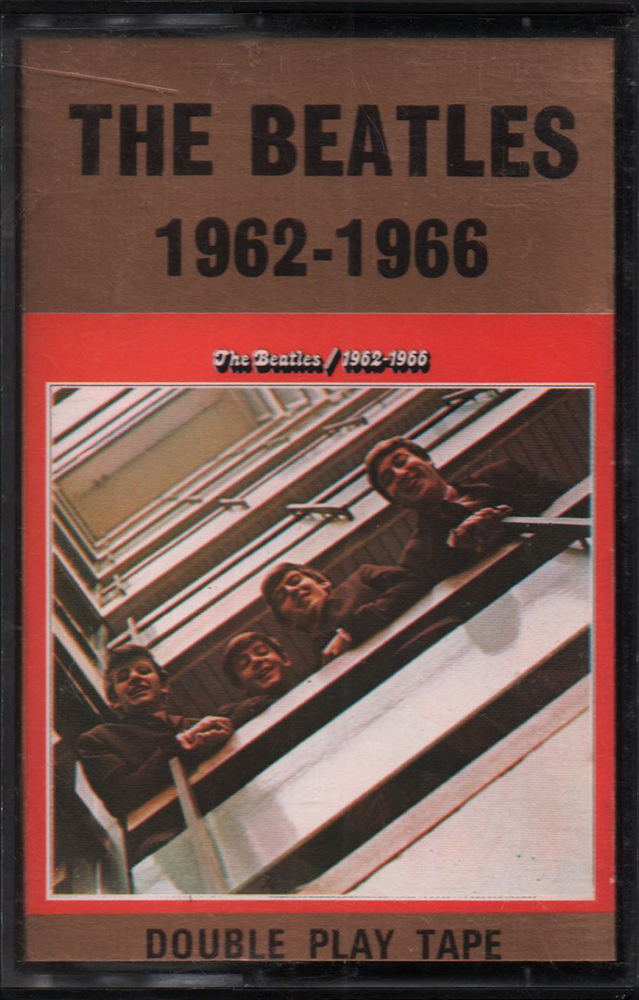 |
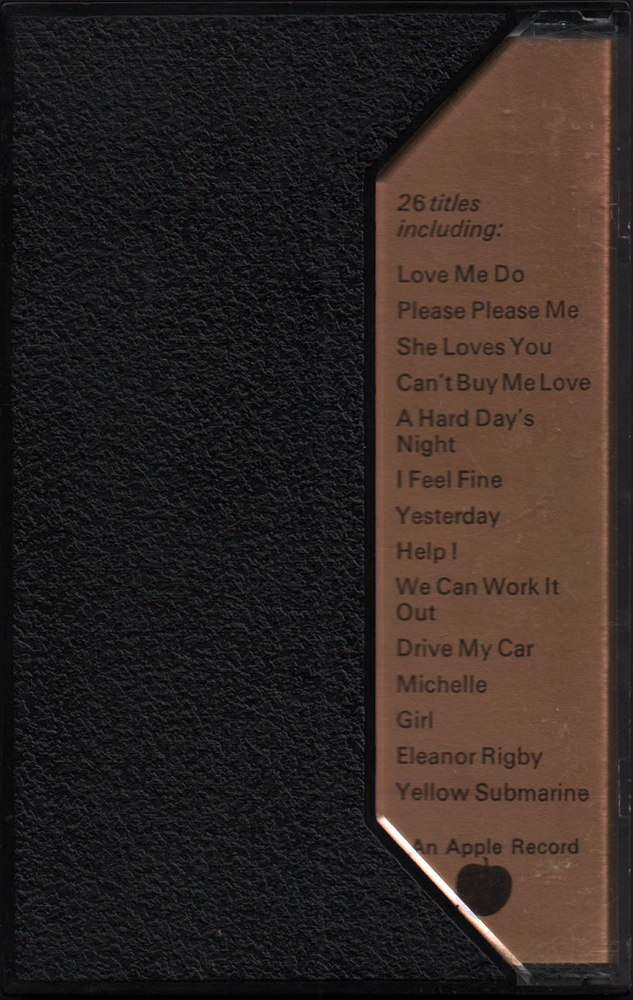 |
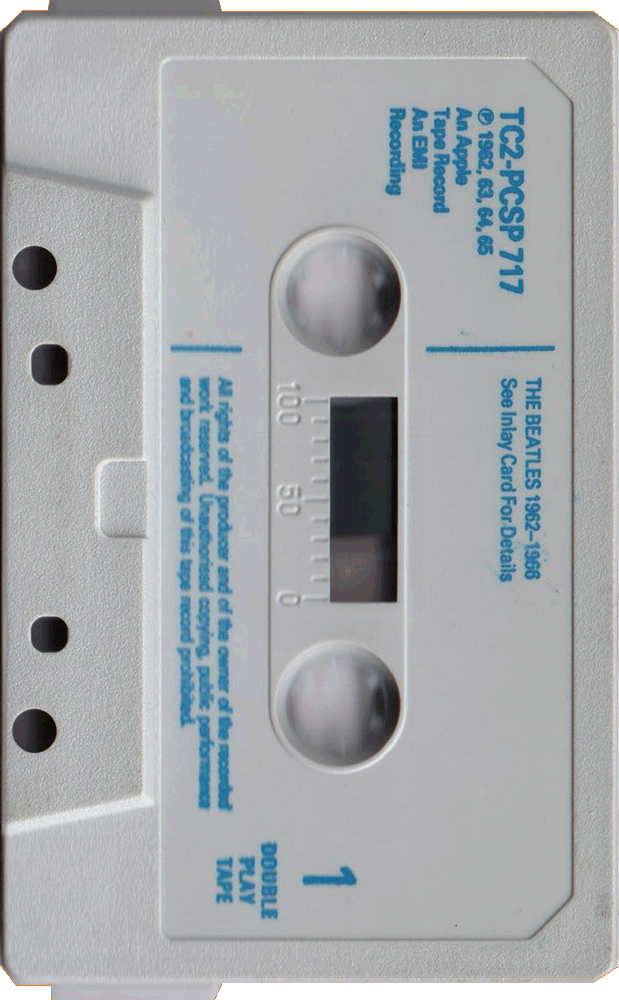 |
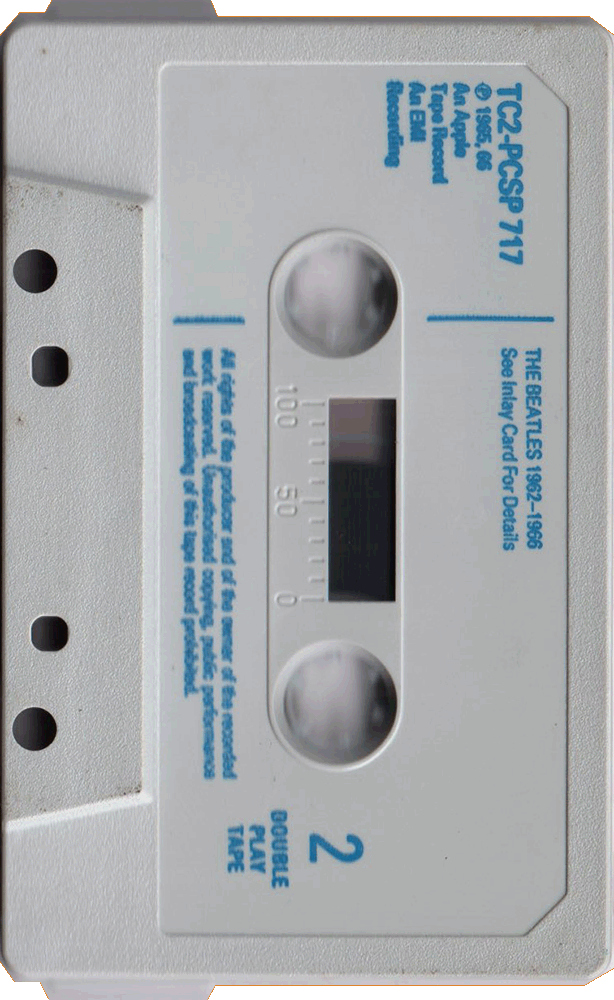 |
|
| The cassette cases ("Norelco" cases)
were clear plastic at the front and around the spine area,
and black plastic at the rear. |
Has direct print in blue ink on the light grey
shell. |
|||
| INLAY |
INLAY: FRONT | INLAY: INSIDE |
||
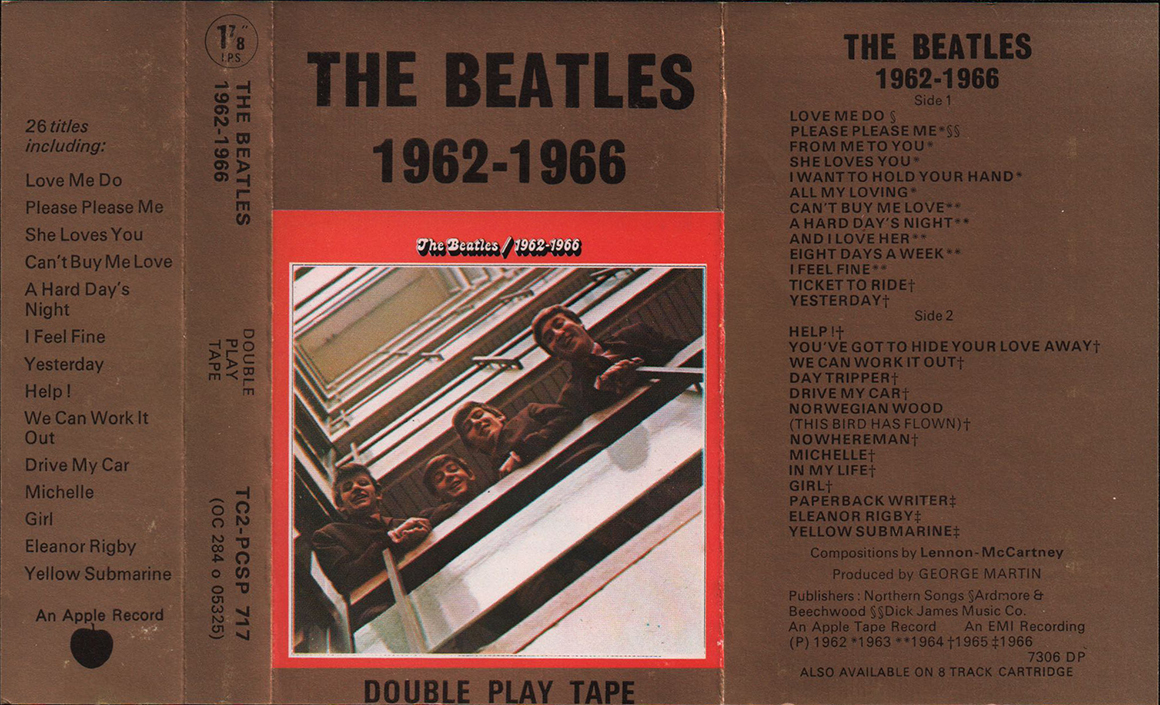 |
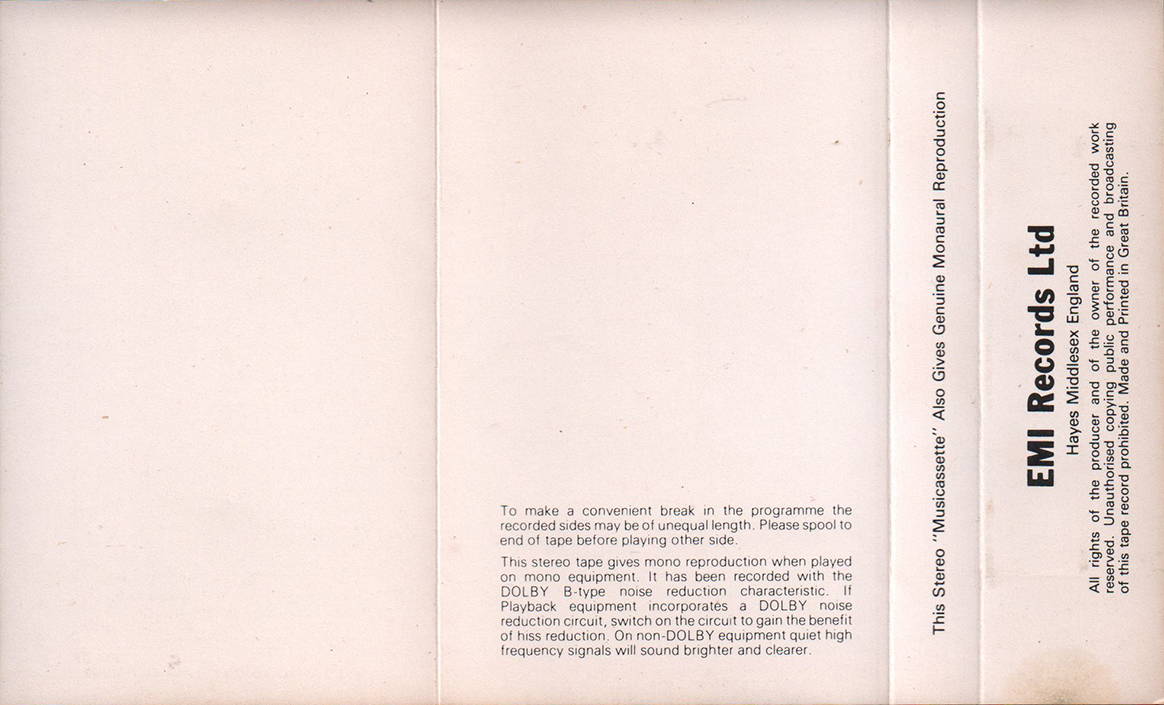 |
|||
| EMI metallic effect "Gold Top" cassette
inlay Type-3': with Apple logomark. "EMI Records Ltd." was printed on the back of the inlay. The phrase "It has been recorded with the DOLBY B-type noise reduction characteristic" was printed on the inlay. ”Gold Top inlay" are believed to have been introduced in January 1972. |
||||
| INLAY: FRONT CLOSE UP | ||||
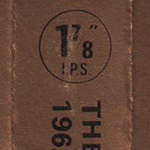 |
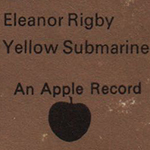 |
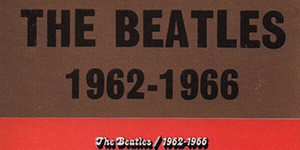 |
The circular 1
7/8 " I.P.S. mark was printed at the spine. Apple logo was added on the inlay. EMI metallic effect "Gold Top" cassette inlay. |
|
| INLAY: FRONT CLOSE UP | ||||
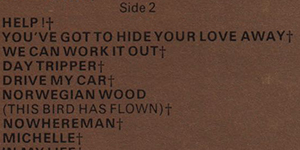 |
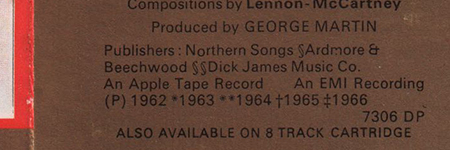 |
|||
| EMI originally issued the Beatles
UK albums on cassette tape with re-arranged running orders,
the excuse being the need to have two sides of equal length
to avoid the problem of listeners stopping the tape at the
end of one side and turning over to start mid-way through
the opening track on the reverse. The cassette of the album "1962-1966" is recorded in the same order as the LP. |
||||
| INLAY: INSIDE CLOSE UP | ||||
 |
Catalog number "TC2-PCSP 717" and the EMI country code (*1) were printed on the inlay. |  |
Printer company's name "7306 DP(**)" was printed at the bottom of the inlay. | |
| INLAY: INSIDE CLOSE UP | ||||
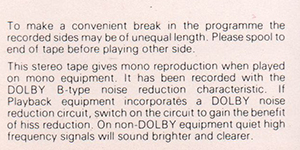 |
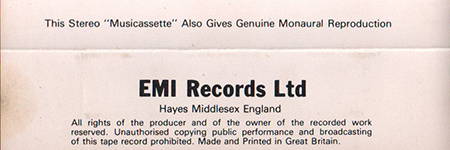 |
|||
| The phrase "It has been recorded with the DOLBY B-type noise reduction characteristic" was printed on the inlay. | Gold top
inlay type-3': "EMI Records Ltd." credit was printed at the bottom of the inside of the inlay. |
|||
| LABEL CLOSE UP | ||||
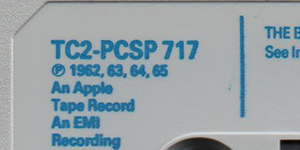 |
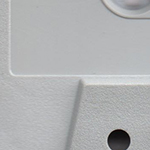 |
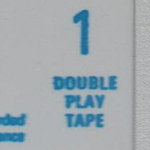 |
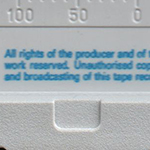 |
|
| The cassettes
was issued direct print in blue ink. The words "An Apple Tape Record" was printed on the label. Dolby System logo was not printed. |
The words "Double Play Tape" was printed on the label. | Notch in Head of one side of Cassette. | ||
| LABEL CLOSE UP | ||||
| SIDE
1 |
SIDE 2 |
No
track list appear on the cassette label(See inlay card for
details). The cassette of the album "1962-1966" is recorded in the same order as the LP. |
||
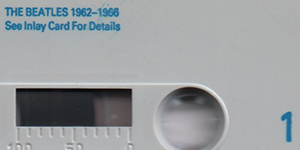 |
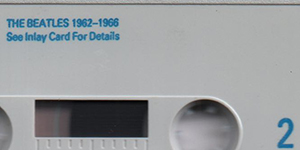 |
|||
| LABEL CLOSE UP | ||||
 |
"Made
in
England/Made
in U.S.A." was not embossed the shell on both sides. |
|||
| OTHER ITEM | ||||
| - |
||||
| LABEL | Direct print in blue ink on the shell /
with Light grey shell |
|||
| MIX | STEREO except as noted |
|||
| RECORD COMPANY'S NAME | EMI Records Ltd. / An E.M.I. Recording /
An Apple Tape Record |
|||
| CENTRAL REMARK "SOLD IN U.K." |
- | |||
| RECORDING PUBLISHED CREDIT | (P) 1962, 63,64,65,66 |
|||
| INLAY FORM | Metallic effect gold inlay Type-3 with
Apple logo / Dolby credit (Foldover) |
|||
| SHELL | Light Grey Shell |
|||
| CASSETTE CASE |
"Norelco"
cases:
clear
plastic
at the front and around the spine area, and black plastic at
the rear. |
|||
| PRINTER CREDIT | Made and Printed in Great Britain / 7306
DP (Deta Packing) |
|||
| COVER DESIGN/ PHOTO/ NOTES | The album cover was designed by Tom
Wilkes. photographer: Angus McBean |
|||
| PRODUCER | George Martin | |||
| COMMENTS | Direct print in blue ink
label cassette. It has a grey tape shell with blue on-body text which suggests a manufacturing date of 1976 onwards. No track list appear on the cassette label (See inlay card for details). "Gold Top inlay” are believed to have been introduced in January 1972. The G&L notation on the inside inlay indicates the printer's initials (Ernest J Day, Garrod & Lofthouse, or Data Packaging). EMI used the same metallic gold inlay design for the "1962-1966" and the “1967-1970” cassette issue, right up until 93, and didn’t issue a Ochre (lighter-brown) version during the 77-83 period. (maybe) The EMI UK catalog no. (TC2-PCSP-717) was on the spine. Added the Apple logomark and the words "An Apple Record" on the inlay. Gold top inlay type-3': "EMI Records Ltd." credit was printed at the bottom of the inside of the inlay. with Apple logo and with Dolby credit. The cassette cases ("Norelco" cases) were clear plastic at the front and around the spine area, and black plastic at the rear. (*1) EMI country code: 0C 284 o 05325 The EMI country codes (introduced on 1 June, 1969): In most cases the EMI Codes are the first two letters of the record's catalog#. These EMI Country Codes were used to indicate the country in which the record was pressed. Note this doesn't necessarily means the record was also released in that country (from Discog). OC / 0C / 1E= UK (**)Data Packaging Corporation: (who also traded as Hellerman Data Packaging Ltd) supplied cassette and 8 track shells, tape and other components to the music industry. The "DP" logo can often be found moulded into cassette shells, especially during the early to mid 1970s. |
|||